#a really important thing to remember about the UK is that most of our major newspapers are complete dogshit
Explore tagged Tumblr posts
Text
I came across the surname Baskerville in a text completely unrelated to Sherlock Holmes (in a book about wild camping), and it's gives some really interesting insight into the history and present state of UK inherited titles and landownership so thought I would share!
'William the Conqueror invaded England in 1066 and then made himself king. It was like any other invasion of conquest, in any other time or realm. King Harold the Second was dead. Long live the King. Life goes on. But there was a difference. New laws saw all of the land seized by the Crown - a relatively unique development in the history of conquest. Sasxon barons were replaced by the Norman lords and their allies. The Domesday Book - the most definitive land registery document every devised - was produced on William's orders in 1086 to identify the new owners and their land holding and what they might owe, in tax, favour and loyalty, to the king: the sovereign Landlord.
Landownership had worked broadly in the same way ever since our ancestors abandoned the nomadic life, and took up the shovel and plough about 10.000 BC. What the Normans changed in Britain was the communal right of access over the land. That system of non-communal access is still very much in force today amoung the modern-day descendents of the Normans. Which is why William's 1086 census - the Domesday Book (and its modern version, the Land Registry) - remains so important. It serves as a legal document that established ownership by the legal holder of the title.
My research into where I could roll out a sleeping bag today meant looking at landownership. I discovered that very little had changed sinde the Norman invasion. Just 0,6 per cent of the population still owns 50 per cent of the British land, and most of this elite are the descendants of the 11th-century Norman aristocracy.
A report - "Who owns Britain?' - by Country Life magazine in 2010 was said to be the most detailed survey of its kind in over 100 years. The research claimed that just 1200 aristocrats and their families own 20 million of Britain's 60 million acres of land. The top private landowner in Europe was the Duke of Buccleuch and Queensberry, who owned 240.000 acres in England and Scotland. Research by the London School of Economics in 2013 claimed that the Normans who conquered England - with surnames Baskerville, Darcy, Mandeville and Montgomery - still dominate the student rolls for Oxford and Cambridge universities, still make up a large proportion of the elite that holds the prime positions in professions such as medicine, law and politics. They also control a good number of the political agencies, public bodies and charitable organisations that oversee rules regulating land management and access.
But 1066 was about more than Saxon lords losing their holdings. It was how it affected the peasants that mattered most. The common rights over common lands like Sherwood Forest and the Kentish Weald were gone. Those rights included the right to roam over woodlands, marshes, moors and coasts of many common areas; to graze animals, collect wood for fuel, tools and buildings, to eat fruits, to collect water from rivers and streams, to catch fish and generally to do all the things that made it possible to live off the land."
From: Wild camping. Exploring and sleeping in the wilds of the UK and Ireland, by Stephen Neale, page 29
I've been to the UK several times for hiking trips, and I remember being puzzled by the system of access to nature at first. It is quite bewildering to be just walking on a perfecty good path, only to suddenly find it fenced off, with aggressive signs warning walkers to KEEP OUT!!! Why are hikers treated with so much suspicion even in areas famous for its good hiking? And what do you mean by Right of Way? How come there's major roads and motor cross terrains within a national park? (turns out they are largely privately owned). Myself, I've never been shy to climb the occasional wall or fence, and pitch my tent somewhere even on private lands. I consider it my own gentle way of resisting the very idea of private property, which creates so much inequality. I've never yet faced any trouble for it, by the way. Turns out land owners have little desire to actually hike on their lands, especially in rain or cold or darkness, and the people who work for them are usually not payed enough to care about a lonely hiker who is causing no disturbance or damage whatsoever xD
#letters from watson#sherlock holmes#the hound of the baskervilles#history#land ownership#wealth inherence#uk#common access laws
24 notes
·
View notes
Note
Hello! I'm a big fan of your network and I find your advice very soothing after a long day of studying. I was wondering if you can help ease some worries I have about a future career? I'm from the states, and I'm entering into my final year of college. I'm planning on becoming a teacher for middle school (unfortunately I'm unsure of what you call it overseas where you are? I want to teach the age range of around 12-13 year olds. My apologies). I've really enjoyed the program so far! I've made quite a few creature friends entering into the career as well, both in and out of my genus. Unfortunately, there's some harmful fear-mongering and stereotypes surrounding my genus, specifically with regards to kids? And they're just the most ridiculous, too? Like, these people think I'm gonna kidnap their kid and pull them to the nearest lake and drown them! Seriously.
Regardless, I'm rather worried about how they could affect me in my future career. I'm not very good at ignoring how people perceive me. While I was working as a lifeguard over the summer, I felt very on-edge and hyper aware of every sapio who looked at me funny. Even though many of these stereotypes are easily disputable, I've still seen quite a few articles spreading this misinformation alongside a wider surge of similar misinformation regarding other genuses. I guess my question is, how do I cope with this?
I'm sorry you're having to cope with this kind of prejudice, reader. Liminal culture in the United States is not – obviously – my area of expertise. That said, we certainly have our fair share of bigotry and anti-creature sentiment here in the UK, so I have high hopes I'll be able to help, at least a little.
The first thing I would stress to you is that it is far easier to be vocal in the name of hate than acceptance, and that venom and vitriol will sell more newspapers (or garner more clicks, as the case may be) than open-mindedness and a live-and-let-live attitude.
Do not mistake the loudest voices for the largest population. Very often, they have been artificially amplified by a media industry that knows the selling power of outrage.
Besides which, people are not generally speaking inclined to march in the streets and wave home-made placards at news cameras for the sake of telling the world, “This is an issue I have no strong feelings about.”
I don't think you should be trying to ignore this issue. But you need to be able to see it for what it is – a loud, vocal minority whose success is due more to the passive silence of the majority than any truth or charisma on their part.
After all, their beliefs are patently absurd! The world is full of aquatic creatures who manage to go their entire lives without drowning anyone – or at least, nobody who didn't deserve it.
Rather than ignoring these people, I think it would be healthier and more fulfilling for you to actively seek out ways to counter their ridiculous narrative.
Look into opportunities to get involved with cross-community education projects. Make your classroom an explicitly creature-friendly space. Support the children you teach and their families to learn more about liminal folk.
In short, let your own liminal life stand as example of the good that can come from mixed genus communities.
There will always be people out there determined to believe the worst of anyone they consider to be the “other”.
But with time, energy, and kindness, we can build a world where they are seen and understood for what they are – small-minded bigots more interested in making themselves feel important than in building any kind of lasting, healthy community.
And if they really get up your nose, remember: you can always drown them.
[For more creaturely advice, check out Monstrous Agonies on your podcast platform of choice, or visit monstrousproductions.org for more info]
28 notes
·
View notes
Text
You know, it’s always great to shit on other countries for stuff we don’t understand! I’m so glad that this literally never has any drawbacks and doesn’t contribute to negative stereotyping!
So. The thing people have to understand. America big. UK small.
This doesn’t sound like a major revelation, but in the context of nature/wildlife, it makes a huge difference. In North America, the population density is just so low that, until the industrial era, there really wasn’t any feasible way for human activity alone to impact these species in the same way. Any time humans wanted an area to be free of predators, they just...went somewhere else.
But where do you go when you’re on an island where the sea is literally never more than 72 miles away. And for the most part, it’s considerably less than that. In every direction, there is a coast with a town/village, or a major river where people want to settle. And over thousands of years, as these settlements formed, and people decided they didn’t want to get picked off by apex predators, those animals were pushed back, and back, and back.
There is evidence of Lynx living in the far north of the UK until as recently as about 1,500 years ago, but further south they had already lost their habitat to farmers. We’re talking BC/BCE here. Again, this wasn’t aristocrats, it was farmers. Trying to farm.
Our forests were cleared over centuries, as people laid out fields for crops, and raised livestock to graze on patches of grass. A lot more went during the tudor period, in the name of building ships, because the Tudors, weirdly enough, weren’t really focused on environmental protection, and like..these forests are huge, man! Who runs out of trees??
We lost bears around a thousand years ago, and wolves in the 1760s due to people, again, not wanting to get eaten while they were travelling. And seeing as they were our only large predators...that’s...pretty much how it happened. The varieties of sheep and cows that exist here have evolved to suit our landscape over time, and in areas where deer population get out of control, there are annual culls to stop them destroying all the woodland.
But, while there are absolutely ongoing efforts to reintroduce lost species to the UK, such as beavers and bison, birds of prey, and even boar, large carnivores are a harder ask. There just isn’t a lot of space here that is suitable. Everywhere you look, there’s another village.
Does the UK have a history of aristocratic dickheads fucking things up for everyone? Well yeah, that’s pretty much what we’re known for. But is the UK a nation of nature-hating psychopaths who go around burning everything to the ground just for fun? No. Not at all.
While the percentage of the UK which is designated a “National Nature Reserve” is absolutely tiny, it’s important to remember that most of our wild spaces aren’t designated that way. We have privately owned gardens that open to the public, and charitable organisations which protect and maintain large areas of wildlife. (Large by UK standards, at least. But remember, the UK is less than 100sq miles in TOTAL.)
No one is denying that the UK has been wholly shaped by human activity, and at this point, has lost every bit of “pristine” nature, along with many large animals. But this is less due to wanton destruction in the name of sport, and more about population pressures in a small, contained space. Island living is never going to work the same as it does on a vast continent, and efforts to bring back biodiversity have to adapt along those lines.
Likewise, the existence or absence of large, dangerous predators have to be understood along those lines as well. Humans aside, we just... have smaller predators these days. Foxes, badgers, weasels and stoats, even wild cats (In Scotland, and highly endangered, but they are native to the UK). We still have a lot of wildlife. It’s just, deer aside, most of it can easily hide when you walk by.

Actually your society is the freaks for shooting everything that moves and burning half your "nature reserves" every year so that upperclass dandies can eat leaded pheasant. North Americans are the well adjusted ones here, your country has become a desolate suburban lawn in island form
#nature#wildlife#good morning rants#for serious though i get a bit of a bee in my bonnet about this shit#it's about NUANCE#there's no point applying your standards to another country#and then getting shocked when that doesn't work#i mean literally#mountain lions have never existed here#what do you want from us
99K notes
·
View notes
Note
saw you tagged "how do you pass the class without knowing at least half the material" on the dan and phil/uk grade boundaries post and i thought id explain even tho that was prob rhetorical: thats not really how they grade here at university! my experience isnt universal because i did a humanities degree not like engineering or whatever, but you dont get quizzes and multi choice tests Ever afaik unless its like, languages and grammar. (for major grades anyway) its mostly essays and coursework, they are testing your application of knowledge more than memorisation of specific things youve been taught. so you do have to know the material, but what theyre grading on is if you can prove it to them, basically. 40 is the pass mark and it usually means its sloppy work but you know what youre talking about or maybe didnt try hard or rushed it, in my experience. in gcses and A levels you do get more of that multi choice thing which is why the boundaries are a bit higher. also that chart says a D is a pass which, technically anything except U ("ungraded") is a pass, but in reality if its less than a C its considered a fail by most people. you have to get C or above in maths and english in order to progress to A Levels, for example. i obviously dont know how the american system works or how they grade you at college but i think the SAT is a multi choice test right? our college entrance exams are A levels and they dont work like that, theyre usually part coursework and part exam, and the exam might have some multi choice questions in but a lot of it will be stuff like "explain the function of mitochondria. balance this equation. translate this excerpt. explain the nitrogen cycle using a diagram" so yeah. god a levels were a fucking nightmare
I don’t know anything about STATs- I’m not American.
I think I misunderstood that it was a college/university grading system. I’ll take the L there. I assumed it was high school.
Regardless- I wouldn’t consider sloppy work to be passing. From when I remember from my grading system it had to be both a clear argument and an understanding of the course material in order to pass when it came to university/senior high school students. That’s how you you would do well in the provincial exams in high school… and that’s how you do well in university exams. Like the exam is to show your demonstration of the knowledge as well as your ability to take outside knowledge and apply it to the material. And we got docked heavy for grammar, which was my worst nightmare because I suck at English grammar. Then course material is just the learning part of the program, yeah it gets graded, but definitely not nearly as important as the tests/exams for demonstrating your understanding.
Multiple choice is like 10% of the grade, short answers and essay questions were the majority from what I did. If you aren’t clear, don’t use proper grammar, and aren’t demonstrating what you learned; definitely a fail- or 50% depending on the prof/instructor. Which is passing where I live.
Which I think is the same thing your talking about, applying rather than memorising. I think we just place the percentage at a different point even thought the bar is the same. If that makes sense? I don’t know. Drunk as fuck. Definitely not rhetorical, I was really questioning how it worked. I like learning so thank you 💕💕💕
0 notes
Note
Hey, I hope ur well. I just found ur page searching about transitioning as a trans guy and singing, and I'm just curious to know if u still sing? And how it's going? I know of trans guys who can sing arguably better after T like noahfinnce and cavetown, but I'm just worried about it that's all. I haven't even started T yet cos I'm from the UK and our waiting lists are very long lol
hey there! i still sing, yeah. i have been taking a really low dose so really my range has honestly only drifted down like 5 or so semitones. i was a music major and ive sung with a lot of guys, trans and cis, and so i have a lot of thoughts on this topic. so i'm going to rant:
the biggest struggle ive noticed is a constant lack of familiarity with how each note feels in my voice day-to-day, since my voice is still actively changing. my solutions to this is are 1.) mostly singing accompanied (i play guitar, uke, and piano) so that i have a pitch reference, and 2.) recording all of my practicing
recording my practicing was something i was required to do in audiation classes in music school, but i only really did the bare minimum for my assignments because singing what was in my head was easier back when my range had been stable for years. practicing with recordings is more important than ever now because my voice is much more sensitive to strain than it used to be before i was on T. that means that if i sing the same thing over and over just to hear myself sing it, my voice will get tired and stop working VERY quickly. now when i practice, i record a run, and listen back a few times while making notes on my music sheet of what i need to fix before recording again. i also tend to avoid practicing at full volume if i have to practice the rhythm of a passage or something like that. sometimes i just speak a passage to get rhythm or pronunciation. anything to avoid singing too much or too hard while still singing enough to practice effectively. ALSO, my tongue and throat haven't been able to relax easily lately, so my warm-up is very different than it used to be to try to address that. my voice is still in the beginning part of changing, though, so what i've got going on is only part of the picture.
for a bit more of what's down the road, i have a lot of friends who are on T, a lot of whom ask me to assess their voice range (i was a music major and i guess they assume im the one to ask). the #1 thing ive noticed is that trans guys whose voice ranges drop significantly tend to get hung up on the fact that they can't sing the high notes they used to be able to sing, while ignoring the fact that they have access to an expanded lower register. i have some friends who have a lovely, rich baritone range, but they are really shy about singing that low because it's unfamiliar, and then they crack their voices struggling to sing notes that wouldve fallen within their former soprano range. ultimately, trans guys with their voice settled into a new range are just as capable of learning to utilize that range as anybody else, and the main block there is mental. a lot of us are just used to singing differently because we've been in a different range most of our lives, and the instinct is just to avoid singing to avoid sounding dumb, rather than practice and re-learn. also i think a lot of my transmasc friends (esp ex-sopranos) were way too pessimistic about how far their voice was capable of dropping, so they don't know what to do with themselves now that their voice change has exceeded their own expectations.
one thing that i think is important to remember is that cis guys have experienced a lot of the same struggles that transmascs on T have with their voices. i was a music major and we had some singing requirements for all music majors, even non-vocal majors, and it really seemed like the cis guys initially struggled a lot more with the basics of singing than the cis girls (and pre-T me) in the class. here are a few things that i gleaned from being in those classes and watching those guys learn to sing:
the biggest thing to consider, especially if you are a soprano before T, is that sopranos have a lot of notes in their range that resonate in their head. the difference between having a "proper head voice" and a falsetto high range is whether or not you're able to comfortably sing high notes that resonate in your sinuses most strongly. why is this a major consideration? when your voice drops and your most comfortable notes suddenly tend to resonate more in your throat and chest, that is WAY harder to hear than those high notes that buzz directly in your skull, especially in the details. going out of key is way more likely when you can barely hear what note you're singing compared to literally hearing your voice vibrating in your head while singing. my professors used to tell guys who struggled with staying on pitch to practice singing either with their hand in front of their face to direct the sound back to one of their ears, or with a piece of paper in front of their face. you could even practice singing to a bathroom wall or something like that. this has already become useful advice for me, since i can't hear the difference between my new lowest notes unless i'm either recording them or hearing the sound reflected off a surface.
another thing that my vocal instructor used to go on about a lot is that shoulder tension has a large effect on your chest voice. if, after your voice drops, you're keeping your shoulders tensed, you might not be able to sing all of the lower notes that your body is capable of producing. my vocal instructor used to tell some of the guys to literally practice singing while lying down??? i don't know if that solution actually helped with the shoulder tension, but the shoulder tension seemed like a real issue that was partially physical and partially psychological. ultimately, decent relaxed posture is something that is always important for singing no matter what your range is.
one more thing is that cis guys had their voices break and drop, too. whenever i or one of my transmasc-on-T friends struggles with singing, i point out that every cis guy who sings has had to deal with this too. it just happened while they were younger and every other guy around them was dealing with the same thing too. and, for them, it could've taken like 5-10 years. a lot of trans guys crank up the T as high as possible for as fast of a voice change as they can manage, and then they have a hard time adjusting to a voice change that only took 6 months or a year or even a couple years. it's gonna be hard to mentally adjust to a voice change when it happens so fast (relatively speaking), and when you're much more alone in dealing with it. all this is to say... yes, it takes a lot of effort to sound decent while singing during a voice change, and it is going to take a lot of effort to get used to that change once it's basically over, but it is something that is possible, since so many people sing despite having a changing voice. even cis women have their voices change over time.
to wrap this big long rant up, there is a lot of very speculative writing about the effects of T on the voice and the best way to retain vocal talent through the effects of T. some will say to avoid singing until your voice is done cooking, some will say that you should sing constantly to avoid losing range. my personal advice from where i'm at right now is that you should practice very gently, but sing as much as you need to to sound decent. having your voice slowly change on T is sort of like if you know how to play flute and every now and then someone replaces your flute with a very slightly larger and lower-toned flute. you don't even notice the change most days, but it makes you sound much shittier at flute if you don't practice before you perform, especially when compared to people who have had the same regular-sized flute for like 20 years.
whenever you get on T, just trust that it'll be fine, as long as you expect and accept that your voice is changing. sing if you want to sing, stop singing if it hurts, try to adjust your technique to minimize pain, and know that you'll be adjusting a lot more than you used to for awhile. it'll feel alien for a long time, but remember that one day your voice will settle into a range once again, and you'll be able to really get to know that new voice. and remember that most of singing well is just maintaining a good ear for pitch (something you can do by practicing any instrument btw), keeping healthy posture, and practicing enough to know what you sound like these days before you perform.
i'm sure everybody whos had T-induced voice changes will have their own opinions about this though, so don't take my word as gospel
147 notes
·
View notes
Text
I have a lot of Thoughts and Emotions about the Les Mis UK and Ireland tour and I am going to talk about them now. I’m not really a theatre kid so these will just be my rambles about fave songs and moments and my emotions. Under the cut for spoilers
First of all we had SUCH GOOD SEATS we were right in the middle of the stalls and we could see e v e r y t h i n g - That isn’t relevant to the tour but it’s important to me that you know
I loved how after Valjean’s Soliloquy as the music for At the End of the Day starts we get the title of the show against the backdrop. I am NOT doing that description any justice but it was really cool and that was the moment where I was like HOLY SHIT I’M WATCHING LES MIS
shoutout to Nic Greenshields’ Javert for just being a SUPER IMPOSING and scary figure like that man is TALL AND BROAD AND I WOULD BE SCARED OF HIM. I liked his performance for the most part. Stars is one of my favourite songs in the show and I think he did a great job of it. I have more to say on Javert’s Suicide but we’ll get to that later.
Dean Chisnall as Jean Valjean was good, but like tbh he didn’t make a massive impression on me. Some of his songs were very shouty, especially Valjean’s Soliloquy. Props to him though because anyone who can play a role like Jean Valjean is massively talented and deserves all the credit.
I’m not really a crier at all, but I said to aro-enj before we went to the theatre that if I cried at I Dreamed a Dream they’re doing something right. Katie Hall’s Fantine was fantastic and heartbreaking and I did shed a tear, so good for her.
omg though at the end of Lovely Ladies, Fantine’s first client was the factory foreman!!!!!! He takes her hand and says “Ah yes, the virtuous Fantine” and I s2g I’ve never wanted to climb down all the seats and onto the stage to punch a character in the face before but I was feeling it there.
The Confrontation was good, but this production had a lot of like, cheorographed fight scenes with lots of punches etc and ngl I found them very distracting at some points?
omg there was a super cute bit following Castle on a Cloud where baby Éponine and Madame Thenardier were copying each other and doing the same mannerisms in a “like mother like daughter” type thing and it was super funny and cute
Thenardier and Madame Thenardier were fun in general- More on that later- But Master of the House is a bop and sorry if you disagree but it’s true
THEN IT WAS 1832 TIME BABYYYYY- Look Down, Paris is another fave of mine and the staging and everything was amazing and of course aro-enj and I did a major flail when we saw our dude our man our guy Enjolras. Also I was such a HUGE FAN of Gavroche in this production he had so much spunk and personality and he was just the coolest lil dude, I really really enjoyed him.
TIME TO TALK ABOUT RED AND BLACK BABYYYYYYYYYYYY. I really enjoyed Samuel Wyn-Morris’ Enjolras. He was intense and passionate and was not there at all for Grantaire and Marius’ fucking about. There were a good few eyerolls and glares but he also wasn’t overly aggressive which was great to see. Steven Hall’s Grantaire was really great as well- Very rowdy and drunk and floppy- During ‘Lamarque is Dead’ and ‘Do You Hear the People Sing?’ he was always over at the side of the stage not actually participating in the Revolution which I thought was very very good characterisation.
And yes, there was ExR. There was a point in Red and Black, I can’t remember when, when Grantaire gave Enjolras a big shit-eating grin and fixed his...Cravat or vest I can’t remember which but I was like YAS. I AM FED.
ok ok real talk I absolutely adore A Heart Full of Love, I just think it is so damn sweet and romantic and I absolutely loved the staging of it. Marius throws a pebble at Cosette’s window to get her to notice him and I was like omg I cry. They are in LOVE, your honor.
For me the biggest surprise of the show was how much I enjoyed Will Callan’s performance as Marius. Marius isn’t a character I really focus on a lot but he was the perfect mix of bumbling and romantic and just the sweetest boi and I loved watching him. During In My Life he did a big dramatic twirl thing and it made me giggle because it was just so Marius.
Nathania Ong’s Éponine was just fantastic. So much personality and On My Own took my damn breath away. I think Éponines are generally cast really well but Nathania’s was playful and young and so so sad at the sad time which is perfect for Ep. And she absolutely made On My Own her own, I had chills.
omg also I can’t remember what part it was at, I think it was just after A Heart Full of Love? But Marius kind of introduces Eponine and Cosette and they recognise each other which I thought was a really great moment. And there was a part where Eponine has fallen over and Cosette helps her up and it was very sweet
Big fan of Javert’s barricade outfit. How do you do, fellow revolutionaries?
AGAIN GAVROCHE IS JUST THE COOLEST CHARACTER IN THE SHOW. He straight up gave Javert the middle finger at the barricades and I died it was hilarious.
SPEAKING OF DEATH, TIME FOR SADNESS THE MUSICAL.
A Little Fall of Rain was heartbreaking, when Gavroche saw it was Eponine who had been shot he ran over and just stared at her and you could see the shock on his lil face. I always think there’s not enough emphasis on the fact that Eponine and Gavroche are siblings so it was a very nice moment. And when some members of Les Amis lifted Eponine away Enjolras went to Marius and wrapped him in a hug ;_; there were some really good Marius and Enjolras friendship moments in the show in general (aro-enj said they understand Marius/Enjolras shippers now :o)
Grantaire and Gavroche had this really sweet big brother/adoptive father and son relationship, and Grantaire was always trying to distract Gavroche and take him away from the Revolution and it was breaking my heart. During Bring Him Home they fell asleep together in the corner of the stage. I cry.
AND THEN WHEN GAVROCHE DIED GRANTAIRE CARRIED HIS BODY AWAY FROM THE BARRICADE AND KEPT SHAKING HIM AND TRYING TO GET HIM TO WAKE UP AND IT WAS THE SADDEST THING I’VE EVER SEEN
OKAY SO then it’s the final battle everyone is dying. Marius gets shot and both Grantaire and Enjolras run to help him at the same time. They look up and their eyes meet and they hug.
I witnessed an ExR hug with my own two eyes and I am literally never going to shut up about it or stop thinking about it. besties I am feral.
OK SO NOW EVERYONE IS DEAD. The barricade got moved away but Gavroche was left on stage and the cart came out with Enjolras’ body on it and they put Gavroche beside him. Big big big ouch.
And then Dog Eats Dog. I like Thenardier well enough and he was a great comedic character earlier in the show, but comedy during Dog Eats Dog hits a wrong note for me. This is one of the most sinister and dark parts of the show, so getting a couple of laughs in when 1) you’ve already had a LOT earlier in the show and 2) you have a comedic song i.e. Beggars at the Feast before the show finishes, it felt unnecessary
OK SO JAVERT’S SUICIDE WAS KIND OF WEIRD???? Nic Greenshields got quite shout-y at some points, and while I understand your acting goals here because of Javert’s despair, I am also going to expect you to like...Hit the right notes. But it definitely wasn’t terrible. Also the staging was super weird for it imo. When he jumped there was a special effect to make it look like he was falling, but his limbs were flailing everywhere and honestly it just kind of looked silly and comical and I actually snorted. Not exactly the dramatic ending for Javert I was expecting.
EMPTY CHAIRS AT EMPTY TABLES RIPPED MY SOUL FROM MY BODY AND KICKED IT TO DEATH. I’ve already said I really enjoyed Will Callan’s performance as Marius, and he was truly excellent here. It was absolutely heartbreaking and his voice and acting were superb, and then when you think it can’t get any sadder Les Amis come out of the shadows and stand around Marius as he sings. At the end Les Amis fade into the background again, and Marius shares one more look with Enjolras before he disappears. SAD.
Also Thenardier changed the “this one’s a queer but what you gonna do?” line in Beggars at the Feast to “this one’s a queer but I’ve tried it too.” Thenardier is bisexual it’s canon now.
ok so FINALE TIME. @ the person whose phone rang LOUDLY during the Bring Him Home reprise if I ever find you I’m going to BITE YOUR ANKLES.
But anyway. One thing I really really loved is that when Fantine came back SHE HAD HER LONG HAIR AGAIN. It really annoys me that Fantine cutting her hair is a symbol of how far she’s fallen, and yet oftentimes when she comes back in the finale when she’s at peace she’ll still have her short hair???? Make it make sense???? So I’m really really glad they fixed that.
The Finale gets me every damn time man. I think I’m going to get through it and then I hear “And remember the truth that once was spoken...” And I lose it. So yes more tears were shed, which again means they did it right. Also Valjean saw the Bishop again during DYHTPS and they hugged and it was wonderful, I love seeing the Bishop and Valjean meeting again in heaven.
BUT YES THOSE ARE MY THOUGHTS the show was so so excellent and so worth it. Stand out performances for me were Katie Hall’s Fantine, Nathania Ong’s Eponine, Will Callan’s Marius and the Gavroche we had that day (not sure which actor we had). But really the whole cast is gonna live in my head rent free from now on. There’s probably a lot of moments I enjoyed that I’m missing but hopefully @aromantic-enjolras will catch any I missed if they do a post about the show. I don’t even know what else to say just stan Les Mis and eat your vegetables I guess.
27 notes
·
View notes
Text
The Crusades: A Fandom Primer
Like many of you, I am very excited to see a whole lot of fic about everybody’s favourite new Crusades-era Muslim/Christian immortal warrior husbands! However, a preliminary reading indicates that fandom is a bit hazy on what actually happened during the Crusades. Or where. Or why. They’re a much-mythologised piece of history so this isn’t surprising, but at popular request – ok like five people that counts – I’m here with a fandom-oriented Crusades primer.
Please bear in mind that I’m not a historian and this primer is largely based on my notes and recollections from several undergraduate history courses I took in the mid ‘00s. I expect the field has moved on somewhat, and I welcome corrections from people with more up-to-date knowledge! There’s also this very good post by someone who is a lot less lazy about links than I am.
Where did they take place?
The Crusades, broadly, describe a series of invasions of the Eastern Mediterranean (modern Israel, Syria, Lebanon, Beirut, Jordan, Cyprus, and parts of Turkey and Greece) by (mostly) Western European armies, religiously justified by their belief that the city of Jerusalem should be part of ‘Christendom’, i.e. ruled by a Christian monarch. In the first expression of European settler colonialism, nobles from the area of modern France and Germany founded four Crusader Kingdoms (aka ‘Outremer’, ‘overseas’) – the County of Edessa, the Principality of Antioch, the Kingdom of Jerusalem, and County of Tripoli.
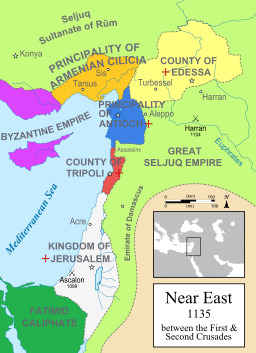
After a first unexpected wave of success in the First Crusade (1096-1099), which surprised everybody including the participants by conquering Jerusalem, the Crusaders were gradually driven and the last part of Outremer was lost to European control with the fall of the city of Acre in 1291. Crusades after that still nominally aimed to take Jerusalem but rarely got very far, with the Fourth Crusade famously sacking the city of Byzantium, their nominal Christian allies, in 1204. During this whole period activity that can be considered part of the ‘Crusades’ took place around the Eastern Mediterranean.
The most important thing to remember is that modern national boundaries didn’t exist in the same way; Italy, Germany, France, Spain, and the UK were not unified nations. Most of the southern Iberian peninsula (modern Spain) was ‘al-Andalus’, Muslim kingdoms ruled by nobility originally from North Africa. Sicily had been an Emirate up until very recently, when it had been conquered by Normans (Vikings with a one-century stopover in France). Italy and Germany in particular were a series of city-states and small duchies; Genoa, if you’re curious about it for some reason, ;), was a maritime power with more or less a distinct language, Genoese Ligurian (their dialect had enough of a navy to qualify). England had recently become part of the Anglo-Norman Empire, which ruled most of England (but not Wales or Scotland) and also large parts of modern France, particularly Normandy.
The Muslim world was similarly fragmented in ways that don’t correspond to modern national boundaries - there were multiple taifa states in Iberia, the Almoravid Caliphate in Morocco, the Fatimid Caliphate in Egypt, and (nominally) the Abbasid Caliphate in Baghdad, one of the great cities of the era, although the Seljuq Turks were the major power in Anatolia (modern Turkey) and what we describe as the ‘Middle East’.
The largest Christian unified power in the wider European/Mediterranean region was the Byzantine Empire, centered on the city of Constantinople (modern Istanbul), which quite fairly considered itself the direct continuation of the Roman Empire, the capital having been moved there by the Emperor Constantine in 323. In fact, the really big political and religious question of the time for Christians was who got to be considered the centre of Christendom (there was no real concept of ‘Europe’ at this point) – the Orthodox Church, the Byzantine Emperor, and the Patriarch of Constantinople in Constantinople, or the Holy Roman Emperor (er…dude in nominal charge of a lot of German and Italian principalities) and the Roman Catholic Church led by the Pope in Rome. The Orthodox Church in Constantinople and the Roman Catholic Church had agreed to disagree in 1054 in the Great Schism, so in 1096 this issue was still what you’d call fresh.
Onto this stage of East-West disagreement and the heritage of Rome crashed the Seljuq Turks, a Muslim group from Central Asia who swept through Anatolia (modern Turkey), Byzantium’s richest province, culminating in the Battle of Manzikert in 1071 which wiped out Byzantium as an independent military force. The southern provinces had fallen under Muslim rule long ago, during the era of the first Umayyad Caliphate – including Jerusalem, famous as the birthplace of Christianity and a holy site for Judaism and Islam as well, but also a fairly uninteresting provincial town. Until...
Until…what?
Here’s why all the geography matters: It is generally accepted that the First Crusade kicked off largely because Alexios I Comnenus, the then-current Byzantine Emperor, requested aid from Western Europe against the Muslim Seljuq Turks. Byzantium often recruited mercenaries from Western Europe; the Normans (aka the Vikings), who had settled Normandy and southern Italy in the past century were frequent hires. Hence those runes in the Hagia Sophia.
Meanwhile in Western Europe, the Pope – Urban II – was having difficulty with the current Emperor, and was eager to heal the Schism and establish the primacy of the Roman church. He declared that an expedition to aid the Byzantines would have the blessing of the church, and that a new kind of pilgrimage – an armed pilgrimage – was religiously acceptable, if aimed against the enemies of Christendom.
Pilgrimages (travelling to holy sites, such as churches that held saints’ relics) were a major part of European Christianity at the time and many people went on pilgrimage in their lives, so this was a familiar concept. Western Europe was also somewhat overpopulated with knights – don’t think plate armour, this is 1096, think very murderous rich men with good swords – who could always use forgiveness, on account of all the murder. The Roman Catholic church, unlike the Eastern Orthodox church, also subscribed to the concept of ‘just war’, that war could be acceptable for the right reasons. And so a whole lot of nobles from the area of modern France, Belgium, England, Germany, and Italy decided that this new Crusade thing was something they wanted in on – and they took several armies with them.
I’m going to skip over a bunch of stuff involving the People’s Crusade (a popular movement of poorer people, got literally slaughtered in Anatolia), the massacres of Jews in Eastern Europe, and a lot of battles, but the takeaway is this: Alexios probably thought he was getting mercenaries. He got a popular religious movement that, somewhat unfortunately, actually achieved its goal (Jerusalem), did next to nothing to solve his Anatolia problem, and gave a succession of Popes a convenient outlet for errant knights, nobles, and rulers: going on Crusade.
How many were there?
Official Crusades that anybody cares about: Nine, technically. Crusade-like military events that immortal soldiers might have got involved with, plus local stoushes in Outremer: way more. WAY more.
The First Crusade (1096-1099): First and original, set a frankly (heh) terrible precedent, founded the Crusader States and captured Jerusalem. Only regarded as a clash of civilisations by the Western Christians involved. For the local Muslims it was just another day at the ‘Byzantium hires Frankish mercenaries to make our lives difficult’ office.
The Crusade of 1101: Everybody who peaced out on the First Crusade hurried to prove they were actually up for it, once the remaining First Crusaders took Jerusalem. Didn’t do much.
The Second Crusade (1147-1150): The County of Edessa falls, Eleanor of Aquitaine happens (my fave), the only winners are the people who semi-accidentally conquer Lisbon (in Portugal) (but from Muslim rulers so that…counts?).
The Third Crusade (1189-1192): You all know this one because it has RICHARD THE LIONHEART and SALADIN. Much Clash of Civilisations, very Noble, did enough to keep the remaining Crusader kingdoms going but access to Jerusalem for Christian pilgrims was obtained by treaty, not conquest. Indirectly responsible for the Robin Hood mythos when Richard gets banged up in prison on the way home and is away from England for ages.
The Fourth Crusade (1202-1204): Aims for Jerusalem, ends up sacking the Eastern Orthodox city of Constantinople, just not a great time for anybody, more or less the eventual cause of the fall of Constantinople to the Ottomans in 1453.
The Fifth Crusade (1217-1221): Still going for Jerusalem, starts with Cairo instead, does not get anywhere it wants to even after allying with the Anatolian Sultanate of Rum, making the whole ‘Christians vs Muslims’ thing even murkier than it already was post the Fourth Crusade.
The Sixth Crusade (1228-1229): Somehow these things are still going. Nobody even does very much fighting. Access to Jerusalem is negotiated by treaty, yet again.
The Seventh, Eight, and Ninth Crusades: Seriously nobody cares anymore and also nobody is trying very hard. Kings have better things to do, mostly. People end up in Egypt a lot. We covered these in one lecture and I have forgotten all of it.
The Albigensian Crusade (1209-1229): Why take a three-year trip to the Holy Land to fight pagans when you can fight the ones in your own backyard (southern France), AND take their stuff? Famously the source of the probably apocryphal ‘Kill them all, God will know His own’ quote, regarding the massacre of most of a city harbouring Cathars (a Christian sect deemed heretical).
Can we circle back to that ‘massacres of Jews’ bit? WTF?
Crusades, historically, were Not A Good Time for Jewish communities in Europe; when Christians were riled up to go and Fight The Infidel, it was a lot quicker to massacre local Jews than travel to the Holy Land. Also, then you could take their stuff. I will note here that it is VERY TACKY to use historical pogroms as backdrops for your non-Jewish main characters so keep this in mind but, like, use with extreme caution in fanfic, okay? Generally life was a lot easier for Jewish communities in Muslim-ruled states in this period, which is why so many Hispanic Jews ended up in Turkey after they were expelled from Spain.
What were they really about, then?
Historians still Have Opinions about this. Genuine religious fervour was absolutely a key motivator, especially of the First Crusade. The ability to wage war sanctioned by the Church, or to redeem your local sins by going and fighting against the pagans, was part of that, too. Control of key trade routes to the East was probably not not a part of it. The Crusader States were definitely Baby’s First Experiment With Settler Colonialism, and paved the theological and rhetorical ground for the colonisation of the Americas. But many individuals on the Christian side would absolutely have believed they were doing God’s work. The various Muslim rulers and certainly the local Christian, Jewish, and Muslim inhabitants of the Holy Land itself were mostly just getting invaded by Franks. As time wound on the Crusades became more and more political (frequently featuring intra-religious violence and inter-religious alliances) and less and less about their forever nominal goal, control of Jerusalem.
How’s Wikipedia on this?
Basically not too bad but I’m not totally confident on some of the bits about motivation (see: white supremacists love this period, ugh.)
Why did they stop?
The prospect of re-taking Jerusalem vanished entirely as the Ottoman Empire centralised and took a firm hold over most of the Levant (and made inroads into Europe, as far as Austria, taking Constantinople in 1453 and finally ending the continuous Roman Empire), the Spanish Reconquista and various intra-European conflicts (the Hundred Years’ War, for example) absorbed military attention, and then the Reformation happened and half of Europe stopped listening to the Pope and started stabbing each other over who was the right kind of Christian. But the concept lingered; white supremacists love the Crusades. Which is why it is a very good idea to be sparing with Crusader imagery around Niccolò in fanfic set in the modern era, and please for fuck’s sake stop with the ‘crugayders’ tag, Yusuf wasn’t a Crusader.
What other fun facts should I keep in mind re: Nicky | Nicolò and Joe | Yusuf?
· Genoa is not the same as Italy; Nicolò is Nicolò di Genova and would have spoken Genoese (Ligurian) and considered himself to be Genoese. Italian as a language didn’t really exist yet. The language he and Yusuf would most likely have had in common was the ‘lingua franca’ (Frankish language, literally) of the Mediterranean trading region, a pidgin based heavily on maritime Italian languages. Yusuf 300% would have thought of him as a ‘Frank’ (the generic term for Western Christians) and probably annoyed him by calling him that until at least 1200 or so.
· Yusuf is apparently from ‘Maghrib’, which I assume means al-Maghrib/the Maghreb (as his actor is IIRC of Tunisian descent), i.e. North Africa. He could have had relatives in al-Andalus (southern modern Spain), he may have spoken languages other than Arabic natively (Mozarabic or Berber), his native area had universities before Europe did. Basically: this is as useful as saying he’s ‘from Europe’, do better backstory writers.
· Taking the whole ‘Nicky used to be a priest’ backstory at face value: being a priest in 1096 looked pretty different to how it did even 200 years later. They were still working on the celibacy thing. The famous monastic orders were still forming. Some priests could and did hold lands and go to war (this wasn’t common but it happened, especially if they were nobles by birth). Nicolò di Genova would not necessarily have seen a conflict between going on Crusade and being a priest, is what I’m getting at. If he was ALSO trained as a knight, he was from a wealthy family; it took the equivalent several villages to support a knight.
· ‘Period-typical homophobia’ is going to look very different for this period. They are NOT getting beaten up for holding hands. Or sharing a bed! Or even kissing, depending on the circumstances! I am not an expert on Islamic sexual mores of the era but Christian ones were heavily on the side of ‘unsanctioned sex is bad, sanctioned (marital) sex is slightly less bad’, and there was no concept of ‘being gay’. An interfaith relationship would be in some ways more of a problem for them than the same-sex one (and in some ways less difficult to navigate than a heterosexual interfaith relationship.) The past is another country.
· Look just no more fanfics where Yusuf is trying to learn ‘Italian’ in the early twelfth century I am BEGGING you all
2K notes
·
View notes
Text
Interview with a Queen “groupie”
Cross-posted to AO3. I encourage you to leave any comments you have there.
---
I compiled this interview following a long email exchange with J, a very sweet lady who went to Ealing Art School between 1972 and 1974. She knew all four members of Queen personally and was part of their larger circle of friends.
First off, you may find this hard to believe. I don’t blame you. But I assure you I’m not pulling your leg. As well as the pictures I share in this post, I have seen current pictures of J (which I will not share to protect her privacy). There is no indication as far as I am aware that she isn’t who she says she is.
Nastally, hold up. How exactly did you find this lady?
She found me. It turns out that she has been following my story Dawn of Aquarius for quite some time. The story is set in 1969. A lot of research about the era went into it, because I wanted to portray that time period - and Freddie’s and Roger’s surroundings - as accurately and realistically as I possibly could. That was what drew J in. She tells me it brought back a lot of memories for her. One of the reasons I love DoA so much is the nostalgia, she says, which genuinely means the world to me. Eventually, she talked to me in the comment section. Of course, I freaked out!
And then, I asked her for an interview, to which she replied: I will give it a go, but you must remember that I am 65 and there were great drugs in the 70s, and at 16, away from home, I had a lot!
And so...
Here’s what is IMPORTANT TO KEEP IN MIND when you read this interview.
These are one woman’s 50-year-old memories and subjective impressions. J has been incredibly kind to let me pick her brain, trying to recall everything as best as she can. In her own words:
Just remember that when I answer the questions, it is from a 16-year-old who is 9 years younger than Freddie and a little girl with no family and friends in a strange country trying to fit in. The only reason I was there, was because some hippie thought I had a unique art style.
---
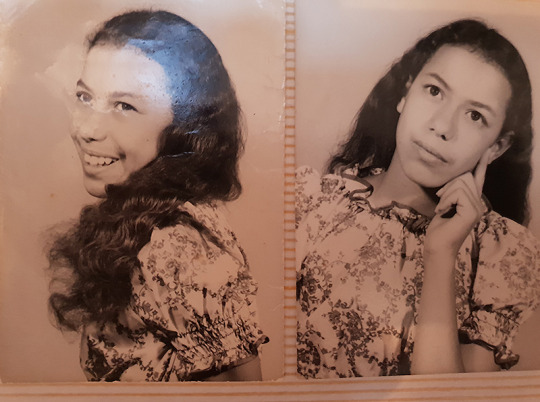
J as a teenager.
[I have edited the interview together from our long, and somewhat messy at times, email exchange. Typos have been fixed and some punctuation added for clarity, but I have not changed anything J has written to me. Again, bear in mind these are personal opinions and impressions.]
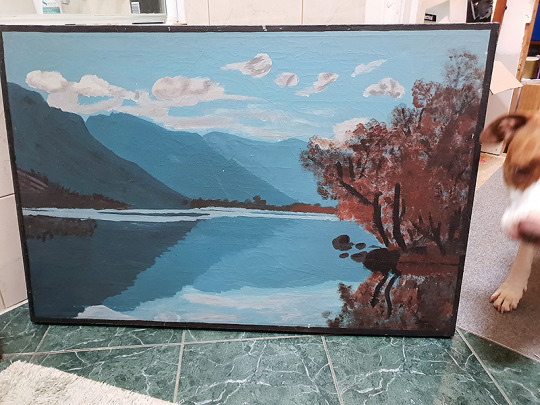
So, J, how did you end up at Ealing Art School in 1972 and what was it like?
This was the painting done for the Australian school-leaving certificate.
It placed first and gave me a scholarship. I could pick France, the USA or England. As a dual citizen of the UK, the choice was easy. The scholarship paid for board and fees, so had to be and sell whatever for spending money.
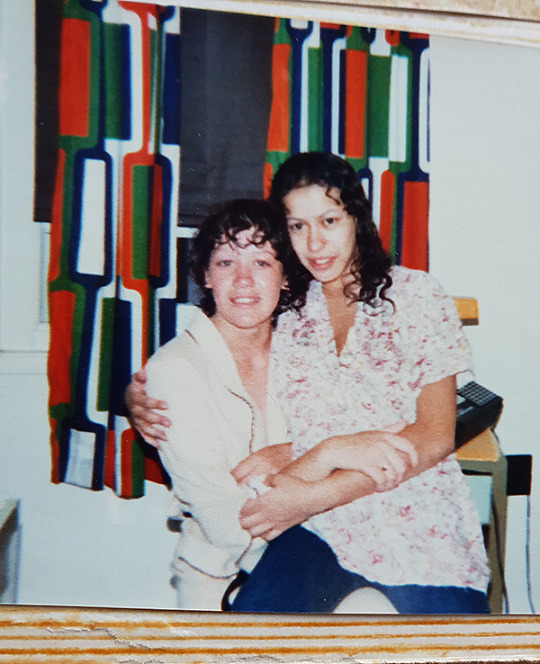
This picture is from the dorm. We all had a 10pm curfew and a very thick rule book that, I am proud to say, I broke every one of them, one by one. The rooms were on the 1st and 2nd floor. We were on the first floor, rooms one side and admin staff the other end. We had two bathrooms for 18 girls. One of them had two baths. The walls were your standard half wall, so it was a given that if you had a bath you run the risk of having a bucket of cold water dropped on you. Downstairs was the kitchen and lounge room.
I want to ask you a few things about life in London in the early 70s, to get a picture of what it was really like. For example, was there alcohol at the music gigs you went to?
If it was a school, church or community hall, no. If it was a pub, yes.
Did you and your friends drink as much then as young people tend to drink now when you all went out?
No, we didn't. I think it had a lot to do with money. We didn't have the disposable income, and it was unheard of to still be living at home with the parents after the age of 20.
Was weed and LSD as big and easily accessible as depictions of the 60s and 70s would have us believe?
The drugs! Got to have drugs. Pot (weed) was easy to grow, very cheap. Used to smoke it in bongs rather than joints, more bang for your buck. Trips [LSD] were cheap, I think. About 2 pounds and you were on the high for over 24 hours with no sleep. My drug of choice was hash. Either the oil or the block. It was a nice high, but you could not function well. But if you listen to the music of the time it really does reflect what it was like, to have a group of friends over for a session. Having said all that the most outlandish and shocking drug I ever saw anyone use was the birth control pill. Didn't you have to hide that stuff away?!
Can you tell us some 70s slang that isn’t really in use anymore? What in the world does “ultra-blagging” mean? (As written in a letter penned by Freddie to his friend Celine in 1969.)
Abso-bloody-lootely!
Man, I thought I was the bees knees to be on a scholarship in London. But that didn't stop me from jigging or having a skive day. They were the days that I blagged my way into a pub, had too many lagers and ended up chundering in the gutter. That was how you knew your night was ace. I would get a right bollocking if anyone found out. It would be a bugger when all that you could find at a car boot sale was chavtastic, but sometimes you could be Jammy Dodger and tickety-boo you find something brilliant. Bob's your uncle. Anyways, I need to see a man about a dog.
[It seems to me that J uses a bit of Australian slang here, like chundering, which makes sense because she is, after all, Australian. She also provided the translation:]
Cheers
J
It would be my honour.
I felt very privileged to be given a scholarship that let me study in England. But being so young and having no family to guide me, it was often tempting to not turn up or give a false excuse for being sick. (I had a lot of food poisoning). These would often happen if the night before I had been drinking beer and ended up vomiting outside the pub. But in my young mind that was a good night. If any of the teachers found me drinking I would be in a lot of trouble. Often I would have to say I was holding it for someone else. Not having much clothes with me, I would buy them second hand from church jumble sales or other students and, yes, Kensington market (the market). Some of the stuff would not be very tasteful or in good condition. But sometimes you would find something that was cheap and in good condition. I will stop this text now as I must go to the toilet.
PS: Ultrablagging sounds very Freddie. Blagging was used, but not ultra, meaning to persuade someone to do something or act better than you are. They were always rock stars.
Sincerely
J
[It was at this point that I realised I was talking to an absolute legend. She also told me then that the majority of her old photographs had sadly been lost when her house was flooded in 1988, including most of the photographs from her stay in London. Noooo! :(]
When you went out to dance, did you have only live music? Were there DJs yet?
You know, that is hard. We did not have a DJ. Sometimes there would be a band. Often we looked for places with a band or the jukebox. I think pubs closed at 10pm and some stayed open to 12 or 1, but public transport stopped at 9. So if you had not arranged a lift then you had to make the last bus. Most of the time we would be heading back to someone's place to get stoned and then crash there. In the morning you would have to work out where you were. When I got back to Australia, the discos were all the rage. They could have been in London too but it was not cool to like disco.
How many people would show up to Queen’s gigs when they played in pubs or at, for example, the Imperial College?
Depending on the location and the night: 10 to 1000!
So how did you first meet the Queen boys?
I was at the pub talking about a band we saw last week when Brian stuck his head into our booth telling us he knew a better one. Thinking about seeing them at the stall... Roger not often, Freddie quite a lot. Often on different stalls, I think that is why I can't remember the name. [The name of the stall. Other sources confirm that Freddie also worked at Alan Muir’s stall, for example, selling shoes.]
How well did you know them?
Just looking at your tumblr account. [she has had a look at my blog, where somebody asked if ‘groupie’ meant she had slept with the band] No, I never slept with the boys. I would not say I was a close friend, but I started at Ealing Art College in ‘72 and moved in the same circles. I loved the music and could be called one of the first groupies. I had to sneak into the pubs because I was 16. Roger always teased me for being so young. They all did seem to be one very large family, not just the band. It was a group of about twenty regulars, both male and female. Everyone knew that Fred was too gay to function. We were all at the gay rights march in London in 1972, had to run after the march. Lots of sharpies [Australian slang: youth gang, thugs] wanting to bash us. Back then I was in every protest that was going, student union rights, even the secretary protest. Just part of the times, stick it to Man or Woman. I left London in ‘74 for Australia, been here ever since and lost track of the boys but have never stopped being a fan.
What do you remember about them? How would you describe their personalities?
Don’t let the trolls hate me, but I did not like Brian. I found him to be rather full of himself. Space was a subject you never brought up around Brian or you would die of old age before he stopped talking. He was always the first to speak and start a conversation and then quickly passed you off to John, who was always tired and shy. Roger was also quite shy at times. He was very self-conscious of his looks, as he felt being pretty, nobody would take him seriously. Fred, well, he was not yet the big star, so I think he was working on his stage persona. When talking to groups at parties, he had the best stories of things that had happened to him or close friends. They were very funny and very descriptive. He was the life of the party. When he had a few to drink or was the centre of attention, he would take a cigarette out of the closest person’s hand and start smoking. Now remember this is the point of view of a 16-year-old girl that was a fish out of water, trying to fit in and not having much worldly experience.
It is said that Freddie and Roger were very stylish. How did they dress in everyday life?
Fred would do his hair and makeup to check the mail. Yes, he was always turned out, but so were a lot of people. Freddie did go over the top with hats, scarfs and jewellery. With Roger, it is a surprise he was able to have kids his jeans were that tight. And his shirts were always open unless he was in a jumper. I think it could have been so that you knew he was male, as it was the start of the unisex clothing. When I travelled out of London I realised it was a London thing. When I got back to Australia everyone thought I was a show-off.
There are some disagreements about how tall especially Freddie was. I know this is a difficult thing to try and remember accurately. But do you remember?
Freddie was taller than me but everyone was. Roger was shorter than Fred, but I never saw Roger in platform shoes. I did meet up with the band by chance at Sydney airport in 1984, said ‘hello’ but they did not remember me, or if they did then they did not say anything and I did not want to be a dork. At that time Fred was the same height as me (5ft 8in/1.72m), Roger was taller than me. It made me think at the time that he had a growth spurt! John was shorter than me and Brian has always been tall. [I have a feeling the platform shoes - or lack thereof - played a vital role here! Although 172cm for Freddie seems likely.]
You said everyone knew Freddie was “too gay to function”. Attitudes towards homosexuality have changed so much that it can be hard for us, now, to fathom what exactly people must have thought of him. Was it more of a joke that he was so camp? Was it something he would have been teased for? Also, he had a girlfriend. Did you ever meet Mary or the other girlfriends?
In 1972 a whole group of us - and I am pretty sure that Fred, Roger, Brian and Tim were there - were in a gay pride march. [Since then, J has found and showed me a picture of a boy she thought was Tim Staffel, and it wasn't, so Tim was most definitely not there. Whether Freddie, Roger and Brian really were there or if J is misremembering, who knows?] Us youth believed you could not choose who you fell in love with and if it was same sex, so what? However, if it was two girls then it was every guy’s duty to change her!
It was also a time that the gayer the guy was, the more the girls were interested. Also, if a guy was gay then you did not have to worry about him and he was a good person to take with you if you were going out drinking. However, the police, parents, teachers and anyone of authority were horrified and treated them badly. I did meet Mary a couple of times at pubs and once after a gig. This is just my opinion, but I found her a bitch. It could be that I was so young. It could be that I was very Australian. It could be that she felt threatened as my accent was a magnet to people around. And the boys (Queen) were no exception. Brian had a cousin in OZ and was always asking questions. I remember that my close group of friends thought that Mary made the perfect girlfriend for Fred as they were as fake as each other. Having said that about them, I often wonder if I would think the same now and if my perceptions were just because she would not give me the time of Day. Chrissy and Jo were a lot of fun.
This was before your time, but I read that Freddie's nickname at Ealing Art School was ‘Freddie Baby’. Any ideas how this came about? His showmanship or maybe personality traits?
I don't think so. There were an older crowd that would talk like that. I think the slang ‘baby’ was a 60’s thing, like groovy baby.
How long, roughly, did Roger and Freddie have their stall? I can't find anywhere when it closed down. What did it actually look like? Was it a sort of wooden stall type of thing? Or an actual room? What were some of the other things people sold at Kensington Market? Mostly clothes or all sorts?
The markets were little divided shops. The back was brick and the walls wood. I have been trying all day to remember the name. [Of the stall.] I think it was something hard to say. More often than not it would be Freddie's dad in the store. It was still open when I left. Roger and Freddie were both in the store on Saturdays and some Sundays. There was a girl, I think Jill, who was in the store more. And during the week it could be anyone. You name it and you could get it at the markets. Second hand or designer clothes, shoes, jewellery, pot and assortments. Hair cuts, food, bric-a-brac.
Wait, wait. What? Freddie’s dad? Really now?
Yeah, it was an older Indian man. so we just assumed it was his father. It was my understanding that he started the stall then the boys would work it as the whole markets were set up for younger people, but if needed he would work there. I don't think the boys would be able to pay the rent on their own. [I have since found out that the stall closed in late 1971, and Freddie continued to work at the Market until '74, for Alan Mair and possibly others. So the stall J witnessed wasn't their original stall - explaining all the different people she saw there - but she had no way of knowing that it wasn't.] They always had incense burning that was very big in the 70s. I still occasionally bring out the sticks, but it does not last like the candles and diffusers of today. If you could get in touch with Robert Daniels, he ran ChaChaDumDum it was the stall across from Freddie. He would know the dates.
[J says it’s this look, in a picture she happened across while looking at my tumblr] Yep, that is the one. It usually means that he does not believe or agree with something that was said and is working out how to respond, or he has lost the plot.
You mentioned Roger seemed shy to you at times. Was he also quite charming? We read a lot about what a chick magnet he was. Was this the impression you had?
My favorite subject! I had a thing for Roger. Everyone has a type and mine is the blue-eyed blond. Now, before you ask, was he brunet? No, he was a mouse/dirty blond. If it was summer he would have blond streaks mostly at the ends. He knew he was pretty and was always dressed in the latest fashion and had the current hairstyle. So, being my type I was constantly watching him. Everyone slept around during that time. I did not notice Roger doing it more or less. 80% of the time he was with Jo. Yes, he was a chick magnet, but he did not do the chasing. He was always very polite to everyone. If it ever looked like there would be any conflict he would be the first to leave it. It was not that he was a coward, just not into conflict. If he saw anyone that needed help he was right there, and often had to have Freddie's back. I never saw him in a fight. He could always talk his way out of things. He was also very patient and would listen for hours to other people talk. However, he would get this vacant look in his eyes at times.
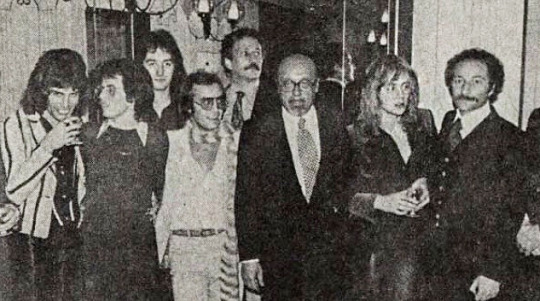
And Freddie would either click his fingers, change the subject or just give up. I don’t think that Brian noticed, and it would be fair game for John, he would see how far he could push it. Roger liked to drink a fair bit and when drunk he would be hanging all over Jo. If she was not there then he missed Jo. If, however, he thought that he or his friends were not being respected, then look out! It was a verbal volcano heading your way. That is what happened to me one time. I was trying to talk with my friends close to where a drunken Roger was and I yelled at him to shut the hell up, you wannabe blond. We/I coped a mouthful back, all in the same sentence, that finished with: Sorry, I didn't realise you were on your rags (period)! I have to have the last word, so I told him the truth: I don’t get them yet! (I was a late starter.) He went so red in the face and called me JB [jail bait] from then.
You also mentioned Roger’s cat Ziggy having kittens. I read about this but never when exactly it was. Do you remember?
I think it was winter ‘73. I remember being cold when he was asking around the pub. [To find homes for the kittens, I gather.]
Is it quite strange reading fictional interpretations of real people you knew? When did you first find out there was Queen fanfic?
No, we used to make up stories about people all the time, a verbal fanfic. Was looking up Adam Lambert and came across the fanfics. Some had me in stitches! Others, like DoA, had me hooked.
Please, allow me to be a little self-indulgent at the end. What's one thing I got totally RIGHT in DoA?
All the Ibex stuff.
What's one thing I got totally WRONG in DoA?
Roger did not have a temper, and I don’t know what the go with his father was, but he would talk about him quite a bit and was always visiting his mum. [Absolutely fair, not only did I change the timeline of Roger’s parents divorce in DoA - for lack of information at the time - but also created a completely fictional narrative around it for the sake of storytelling.]
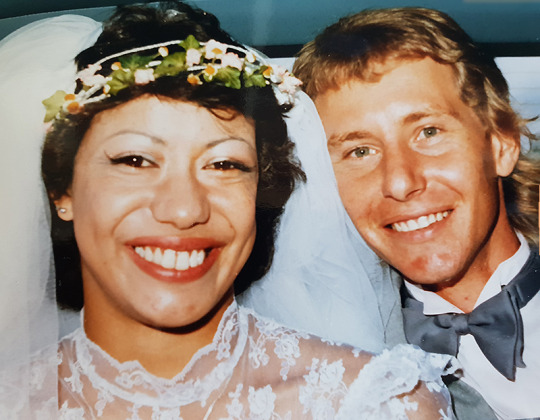
J, thank you so much for all this, sincerely. Can you tell me a little more about yourself? Are you still an artist?
I don't paint or draw any more. At the age of a 50 the doctors operated on an aneurysm or three, and now my eyesight is very bad, I have no fine motor skills and a tremor. I was married in January 1984 and have just celebrated our 37 year anniversary. I have one daughter who is 30 and two great, although tiring grandkids. A girl, 11, and one boy, 5. I have lived my life as the average middle class Australian with great memories. Talking with you has helped me a lot to remember a time when the world was mine for the taking. When I returned to OZ I started nursing, met my best friend, and we planned that once we graduated we would go back to London to study midwifery. But I fell in love instead.
J's wedding in 1984. As you can see, she found her own blue-eyed blond.
---
Upon request, J has shared some of her past and present artwork with me.
These are from her time at Ealing Art School:
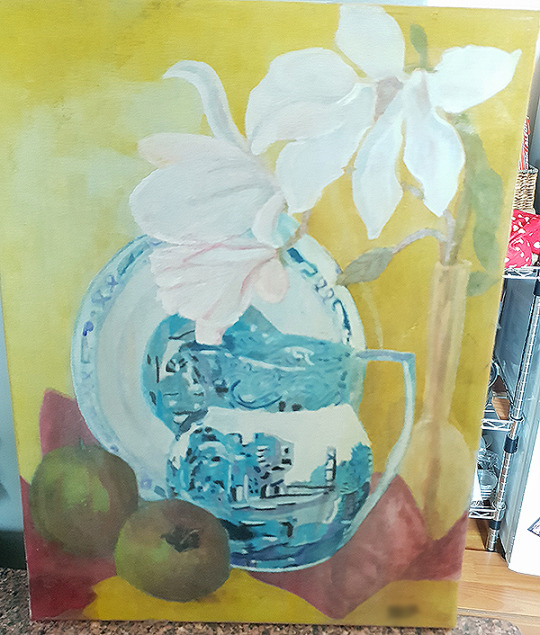
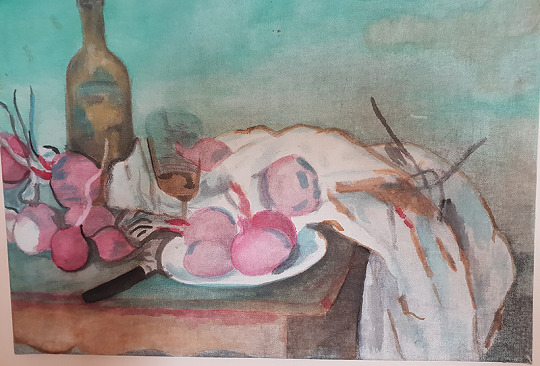
These were done later, back in Australia:

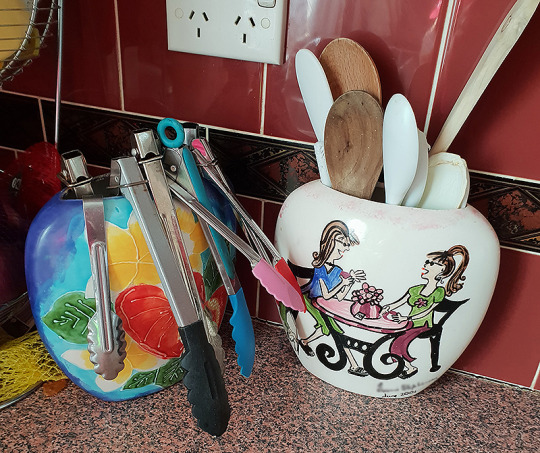
J: Did this just before Christmas as you had inspired me. It did not require fine motor skills!

So there you have it! I hope you found this little glimpse through a 16-year-old girl’s eyes as much of a fascinating read as I did. I urge everybody one more time to remember that J did not have to share any of this, and I think we all owe her a big thank you for delving into her memories. She is likely to see the responses on AO3, so I have comment moderation enabled there as I will not let anybody harass this lovely lady. The tumblr she created is @since72, but she isn’t really an active user and also very new to it all. Again, I can only urge everybody to be respectful.
If you have other burning question for J, feel free to leave them in the comments on AO3. I will either pass them on, or she may want to reply to them herself directly.
#Queen band#Freddie Mercury#Roger Taylor#John Deacon#Brian May#interview#i am so excited about this#so much into#information#JB
363 notes
·
View notes
Text
what is canon and should we respect it (a not-essay on aftg fandom)
i want to write an *entire* essay on this but i am between meds right now so exhausted and suffering a HEAT WAVE (uk?? why! we are normally so temperate) and also there's always a risk of sounding patronising when trying to put your opinions/experience across, so i'll try to write briefly and wotnot
what is canon:
"the material accepted as officially part of the story in an individual universe of that story" or, as we'd probably all put it "wot the author wrote"
why this matters, and why the author matters - our characters wouldn't exist without them
beyond a basic respect for the author, which i would define as like not being a bitch to them (because every human being has feelings, and this is something easily forgotten on the internet), we land on the question "should we respect canon"
well... maybe?
it sort of depends why you're here. the experience of literature/art can be defined a few ways: what the author intended, what the reader experiences, the impact on society.
what nora intended: if you care, she's written a lot of extra content on tumblr. but given that the majority of people who read the books probably won't care enough to find the extra content, this isn't canon. it isn't canon because it isn't in the books of the story. calling it canon is gatekeeping. but it's SUPER FUN and i enjoy seeing what nora's interpretation of her own characters are. thanks nora we luv u.
the impact on society: people get SO UPSET about this question. and it's a reasonable question for sure. art does impact society and vice versa. i just kind of don't think this is the big deal you think it is. people are always hunting for signs of homophobia, sexism, transphobia etc in fandom works. and like... sure, you can do that if you'll enjoy it. this essay isn't really about this, and i don't want to ramble. but aftg is an indie publication. its impact is so insubstantial. maybe chill out. the people who are like AARON IS HOMOPHOBIC BUT ANDREW THE MURDERER IS UWU or, opposite, SETH DESERVED REDEMPTION AND MATT IS ABLEIST - my guys it's a book. these characters are flawed. literature isn't meant to be a pinnacle of morals (unless... it is) and we're supposed to love these characters because they work through their flaws and settle into who they are. are they still dicks at the end? sure! it's fun. not everything has to be light and perfect. and you'll have more fun with art if you stop hunting for homophobes in the fandom of an independent publication with a few thousand readers. that's not how to succeed at the gay agenda. we're on it, i promise.
WHAT THE READER EXPERIENCES: this is the big one! you know when you read a book or watch a film and say "oh wow so it was about THIS, THIS was the important bit!" and someone disagrees? well, they're not wrong and you're not wrong. experience is a whole thing. what someone has experienced in life before they come to the art, what they experience during the art itself. art is a communication from the creator to the audience and that communication is subtle and will be different for *every* single person.
this will upset a lot of people, but it isn't canon that neil is demisexual. the label isn't mentioned once in the books. can it be inferred? ABSOLUTELY. he's demi in all of my fanfics because i personally love it. but nora mentioning it in extra content does not make it canon, in the same way that jkr telling everyone she saw dumbledore as gay after the books, does not make it canon. #theauthorisdead (but let's still be nice to them. ...unless you're jkr. fuck jkr.)
my point is just that canon doesn’t always matter. collectively most of us have decided neil is demi, which is important rep to a lot of people without rep. how sexy of us.
and experience matters. there will be people to whom it's important to write neil as not-very-demi. there will be people to whom it's important to write neil as super ace. be kind to each other.
i've decided i need to add another heading.
WHAT'S THE POINT OF FANFICTION?
to preserve canon? no, because... nora already did that. there's a huge amount of fun to be had trying to write neil and andrew as *accurately* as possible - but this *accuracy* will be different from person to person. because a work of literature is complicated and writing is hard and - individual experience. we've already gone through that. but like, have you ever tried to write andrew's dialogue accurately, the way he speaks like he's half-high half-shakespearean?? it's DIFFICULT. i have tried.
you know what's also fun? experimenting. what would their relationship be like if neil was an alcoholic. what if andrew liked wearing dresses. what if one of them cheated. what if matt died of a drug overdose.
in my head the point of fanfiction is EXPLORATION.
sometimes you're exploring the characters as accurately to your experience of them as possible, sometimes you're adding a new element in to see how they would react. let's be honest, that new element is usually something you're obsessed with in your own life. gender presentation? why people cheat? why people relapse? why relationships break down?
anyway, back to the list.
WHAT'S THE POINT OF FANFICTION?
to dick around and have a nice time? yes.
to work through your own identities/traumas/what have you? probably if you're anything like me and basically everyone i know in the fandom lol.
i think this is everything i want to say.
no wait i lied! final point.
if you've ever studied literature or philosophy the first things they teach you is to question *everything*. for example: what is fanfiction, what is canon, "we have to respect canon" do we??
if you've heard someone using the word "feminisation" to mean "make neil soft uwu", rather than repeating the word, question why it's being used here. what does feminise mean, what does soft mean. maybe you love the dark side to neil, maybe other people like the side of him that can heal.
there's nothing wrong with playing with sexual dynamics and relationship dynamics. sometimes you might be writing something cliched, homophobic, sexist - if you work out you are doing that, maybe stop it. on the other hand lots of couples *do* play out the dynamics of - trousers on in the bedroom, trousers on in the relationship. it's not homophobic to depict a homosexual relationship where one is subby and one is dommy. it exists. so like, chill a little.
and remember you are not always right and everyone is different?
man did i accidentally make this patronising?
woops.
lots of love hedy x
#aftg#fanfic#a whole fucking essay#yes im gay and my gf is sub as shit#it's fucking hilarious#i'm also an ex-lit student and i miss it#be gay do crime#etc#if you're mad at me come tell me#conversation is cool#just be nice to each other plz
81 notes
·
View notes
Photo
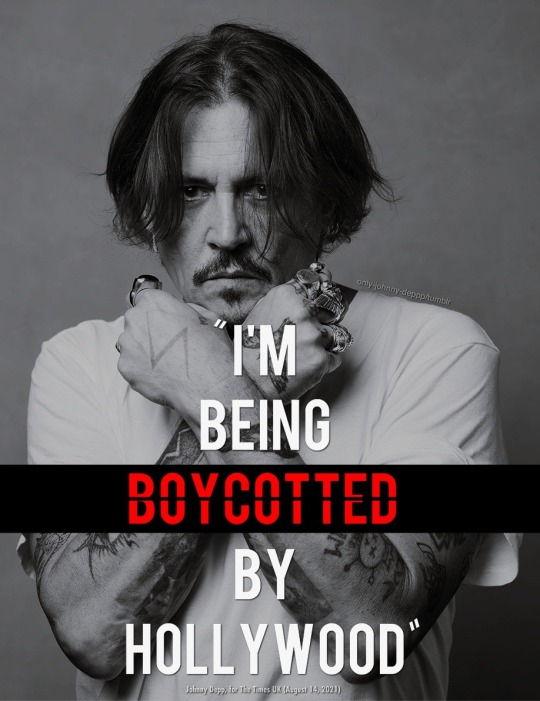
“Whatever I’ve gone through, I’ve gone through. But, ultimately, this particular arena of my life has been so absurd...”
Johnny Depp’s NEW INTERVIEW!
Last saturday, August 14, The UK Times, released a new interview with Johnny for the Sunday Times section. It was realized sometime earlier this month, in London, probably on the same day he and Andrew Levitas were recording for the Q&A for the “Minamata” release in UK. This is Johnny’s first interview since the UK trials in London last year, and released three years after Johnny’s major interview for the British GQ Magazine. Here Johnny and Andrew Levitas speaks about “Minamata”, his future as actor and a thing or two about his personal life, although he cannot talk about the court case.
For those who couldn’t read yet, here is the FULL interview: Enjoy.
***
“I’M BEING BOYCOTTED BY HOLLYWOOD”
Johnny Depp has a new film out this week. In the opening scene his character, the real-life photographer W Eugene Smith, says, “I’m done. I’m tired. My body is older than I am. I’m always in goddam pain. I can’t trust my f***ing dick any more. Constantly in a foul mood. Even the drugs bore me.”
I ask Depp if Smith’s despair resonated with him. Depp stops. Rocks back and forth. “That’s interesting,” he replies with painful hesitation.
“I didn’t approach playing Smith in that way… Although you bring your toolbox to work and use what is available. Having experienced...” He stops again. Depp takes any questions that might refer to his calamitous libel case last year slowly, in a mumbly, croaking drawl. “A surreal five years…”
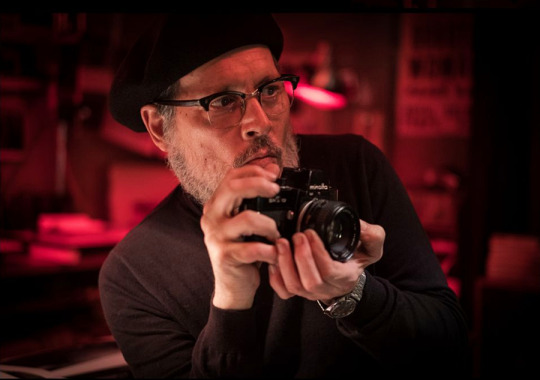
In the film Smith needs to revive his reputation. In real life Depp’s task is even more daunting. Thanks to the judgment, everyone can call him a “wife-beater”. Now he must convince a Hollywood still convulsed by #MeToo that he’s not toxic — and that any attempt to rebuild his career is a risk worth taking. This is Depp’s first interview since the case.
We are speaking over Zoom, Depp in his London home, in front of a gold-framed painting. The 58-year-old is wearing a lot of clothes. Earrings. Floppy hat. Sunglasses. Bandana. Scarf. Checked shirt over a T-shirt with an indiscernible slogan. If you saw him on the Tube*, you might think he was off to work at the London Dungeon*, to play most of the characters.
PS. For those who are not familiar with British words: * Tube = British slang for London Underground, the subway trains. * London Dungeon = is a walk-through experience that recreates scenes from London's scary history in a mixture of live actors, special effects and rides.
Depp resumes, talking in broken sentences about the new film, Minamata, in which Smith, via Life magazine, exposes the brutal mercury poisoning of Japanese villagers in the early 1970s.
“How do we do this?” he asks rhetorically, meaning how to speak about the elephant in the Zoom. “Well, there’s no way one can’t recognise the absurdity of the mathematics.” He grins. “If you know what I mean?” No. “Absurdity of media mathematics.” He talks in riddles. “Whatever I’ve gone through, I’ve gone through. But, ultimately, this particular arena of my life has been so absurd...”

He trails off again. He is holding a big brown roll-up of some sort. “What the people in Minamata dealt with? People who suffered with Covid? A lot of people lost lives. Children sick...Ill. Ultimately, in answer to your question? Yeah, you use what you’ve got. But what I’ve been through? That’s like getting scratched by a kitten. Comparatively.”
Last July, I went to the High Court in London to watch Depp on another screen — a video from the socially distanced court where the Hollywood star was losing a libel action against The Sun after it called him a “wife-beater”. It was the grottiest showbiz trial of the century. There were photos of the actor passed out in a foetal slump, socks on show. One lengthy exchange involved faeces. Another urination, inside or outside a house, after a violent night with his ex-wife Amber Heard.
This had all been going on for a while. In 2016 Heard applied for a temporary restraining order against him. The couple had long endured a narcotic, booze-filled, childish relationship, but that does not matter — 12 incidents levelled against Depp were proved, said the judge, and abuse is abuse, regardless of how badly they both behaved. Depp wanted to appeal, but the court said no. Next April in the US he has a $50 million defamation case against Heard relating to an opinion piece she wrote about being the victim of domestic abuse. It may be his last roll of the dice.
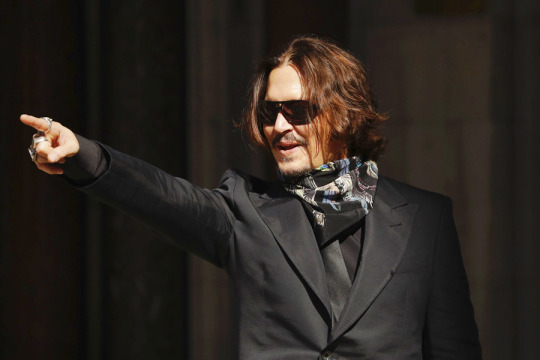
In the 1990s Depp was a sensitive heart-throb. Cooler than DiCaprio, edgier than Pitt. In this past year he has been stripped of his status and dignity. On day three of the trial Sasha Wass QC, representing The Sun, asked Depp about daubing a penis on a painting. He could not remember. “That would be quite a big thing, painting a penis on a picture?” Wass asked. “Quite a big thing?” Depp asked.
It was a well-delivered line, but Depp was on show. Performing. Now he is more timid, less lucid. His people say he cannot talk about the court case given the looming US trial, yet it hangs over everything. The director of Minamata, Andrew Levitas, is also on our call — as a pub trivia aside, Levitas is married to the Welsh singer Katherine Jenkins.
The two men clearly get on. “With regards to journalism, it was important for us to put across in the film the power of truth,” Levitas says. Depp nods. “The responsibility of journalists to look after citizens of the world. [Our film] coincided with the moment important publications had to put Raquel Welch on a cover to get enough eyeballs to sell enough ads in order to put something meaningful inside. A result of that is clickbait — it’s destroying the purpose of journalism,” Levitas continues.
“You said it beautifully,” says Depp, one of the world’s most pinned-up men, who built a career on magazine covers. “I couldn’t say it better than that.”
Last month Levitas wrote to MGM, which bought Minamata for the US market but decided not to release it. He accused MGM of being concerned that “the personal issues of an actor in the film could reflect negatively upon them”. Then the letter got really strong. Levitas accused MGM of failing in its “moral obligation” to release the film and said it needed to explain to the victims “why you think an actor’s personal life is more important than their dead children”. He then attached Smith’s photos of ghastly deformities that shocked the world 50 years ago.
“It’s important that the movie gets seen and supported,” Levitas says. “And if I get an inkling it’s not going to be, it’s my responsibility to say so. Where it goes from there? I don’t know. But we have responsibility to these victims . . .”
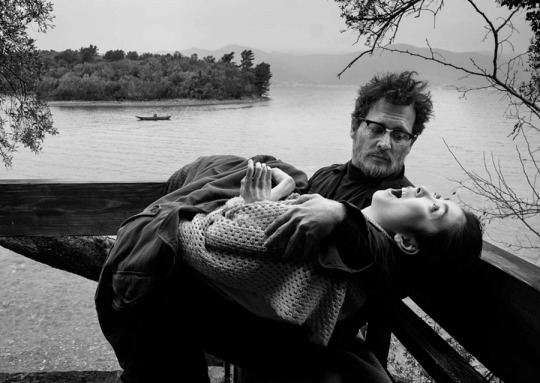
You can see why he’s passionate. The film is good. MGM bought the film because it is good. Depp is good too. He disappears into the role, far from his more recent pantomime parts. It’s being released worldwide, just not in the actor’s homeland.
Depp, who also produced the film, interrupts. “We looked these people in the eyeballs and promised we would not be exploitative. That the film would be respectful. I believe that we’ve kept our end of the bargain, but those who came in later should also maintain theirs.”
“Some films touch people,” he adds. “And this affects those in Minamata and people who experience similar things. And for anything…” He pauses, as he does. “For Hollywood’s boycott of, erm, me? One man, one actor in an unpleasant and messy situation, over the last number of years?” He trails off. “But, you know, I’m moving towards where I need to go to make all that…” Again, he trails off. “To bring things to light.”
The fact, as I think Depp knows, is that for his career, the court that matters is not one of law, but public opinion. On social media, where a lot of minds are made up, Depp’s good reputation will always outweigh the bad, thanks to his frequently blinkered fans.
Outside the High Court, as Heard arrived, I saw Natasha, 30, yell: “Get hit by a truck, Amber!” She is extreme, but the persistent way his fans demand that others think their idol is a saint shows a career revival will happen. After all, most filmgoers do not follow his private life at all. To them, he is Jack Sparrow, Edward Scissorhands. To them, he is a star — and a star can take an awful lot of heat before it burns out.
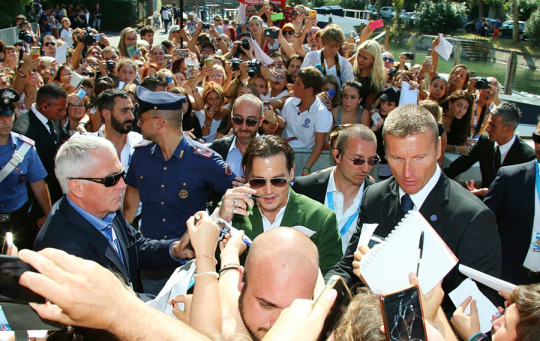
“They have always been my employers,” Depp says of his fans. “They are all our employers. They buy tickets, merchandise. They made all of those studios rich, but they forgot that a long time ago. I certainly haven’t. I’m proud of these people, because of what they are trying to say, which is the truth. The truth they’re trying to get out since it doesn’t in more mainstream publications. It’s a long road that sometimes gets clunky. Sometimes just plain stupid. But they stayed on the ride with me and it’s for them I will fight. Always, to the end. Whatever it may be.”
Depp will talk like this for ever — about his “truth”. Minamata is the last film Depp has listed on the industry site IMDb, where actors usually have half a dozen in development. So, yes, fans of the actor can see Depp in a new role now — it is a return, but is it a relaunch? The film was finished in 2019, way before last year’s court case. Is that it? His last film? He thinks and looks off to his bookshelves, at biographies of Betjeman and Olivier.
“Er...no,” he says, eventually. “No. No. Actually, I look forward to the next few films I make to be my first films, in a way. Because once you’ve...Well, look. The way they wrote it in The Wizard of Oz is that when you see behind the curtain, it’s not him. When you see behind the curtain, there’s a whole lot of motherf***ers squished into one spot. All praying that you don’t look at them. And notice them.”
I would ask him to explain, but I am not sure he is an explainer. Watch this space, I guess, but he is already taking a first step back. After we speak, it is announced Depp is getting the coveted Donostia award at the San Sebastian Film Festival next month. Some people are just too famous to fail.
~ Interview by Jonathan Dean, in London, for The Times UK (released on August 14, 2021)
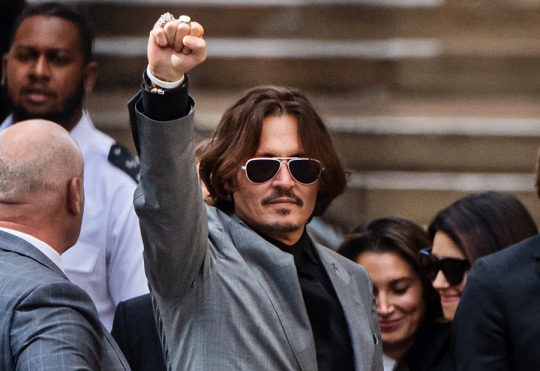
#Johnny Depp#New Interview#Interview#Minamata#Justice For Johnny Depp#I Believe Him#Johnny Depp is Innocent#The Times UK
66 notes
·
View notes
Text
Hellblazer Issue #13
THIS. THIS FREAKIN’ ISSUE.
Honestly, the best review of the chapter would just be this picture and nothing more.
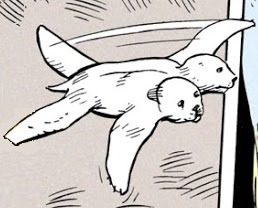
Just this thing. That’s really all you need.
However, I wanna dive into my thoughts on this a little more. So, off we go.
Okay, so I love the flashback to John’s childhood. I think that it’s easy to look back on our childhood and think of the “good ol’ days” when, in reality, those times were often not so good in the moment. I like how he addresses that by talking about what problems he could have faced during that supposedly happy time for him. In my own case, my family used to go to the ocean every summer. While I do have fond memories of those trips, as I reminisce about them, it doesn’t take long for me to recall the more unpleasant aspects of it that are easily forgotten in the sea of mental and physical snapshots of smiles and laughter.
Ahh nuclear power. This is a subject touched on early in Swamp Thing, and rightfully so; the avatar of nature and life would certainly have a bone to pick with nuclear energy and the destruction it can/does cause. In the case of Hellblazer here, this chapter outlines yet another social issue relevant to the time. On a side note, it’s chapters like these that are part of why I love these early issues. They are a time capsule that explores the issues of the time and presents them in a way that still feels very real even 30 years later. I mean, nuclear energy is still such a point of contention in the world today, not to mention nuclear weapons.
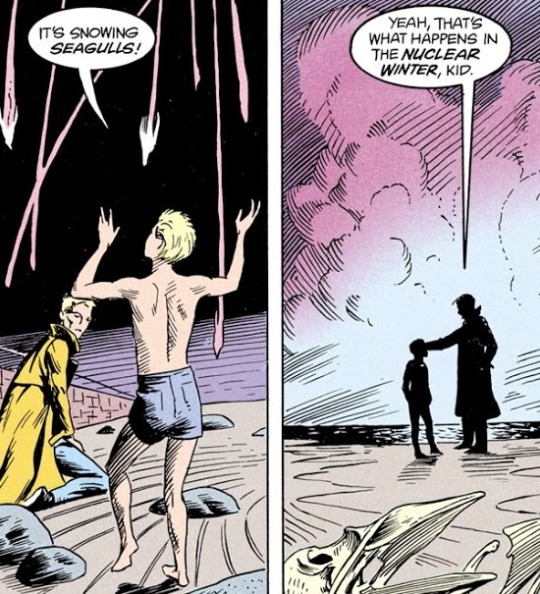
Now, I don’t know much about nuclear power usage in the UK or the feelings on it in the late 80’s-early 90’s. According to what I was able to find online, there are 13 nuclear reactors in the UK today. Like in other countries that use nuclear power, it’s believed that the benefits of having them outweigh the risks; not using fossil fuels, low emissions, relatively high efficiency, etc. However, as Chernobyl, the Three Mile Island accident, and the Fukushima disaster have taught us, these power plants can be dangerous with effects that are straight up nightmare-fuel. Only worse, because those nightmares are real.
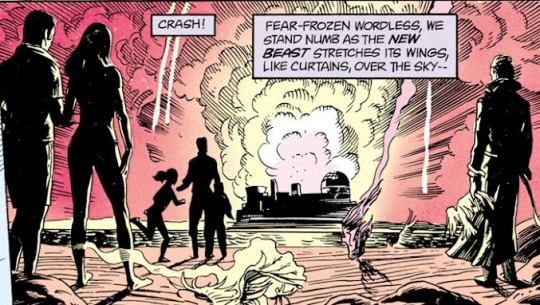
Growing up in an Okinawan/Japanese household, the dangers of radiation, nuclear power, and nuclear weapons are stressed from a very young age. I remember reading books about hibakusha as a child and observing days of remembrance for victims of the bombs. War in general is a big no-no. So, the aftermath of the nuclear plant explosion really had me thinking about the hibakusha a lot.
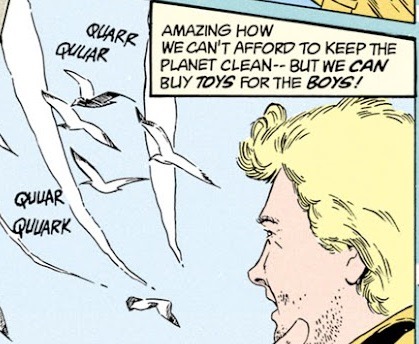
Woooo this panel. I keep reading about how if all the major companies pitched in a small fraction of what they make the oceans would be spotless. I read the Japanese news, and the fact that the waste from the nuclear plant meltdown in 2011 is going to be released into the Pacific Ocean has incited public outrage. The American military base in Okinawa is poisoning the water supply, pushing native wildlife to extinction, and killing the coral reefs. The companies can afford to keep their executives in homes with golden shitters; the world’s governments are ok with spending over half it’s budget on guns; it seems that the world’s biggest players are more than willing to spend their money to keep handling things as they are. Even to the detriment of the environment. Even if it means sacrificing the health of not only the future, but the here and now. Supporting war and death over health. Disgusting.
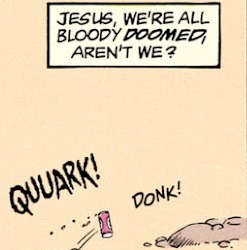
Yes, John. We are pretty much doomed in one way or another.
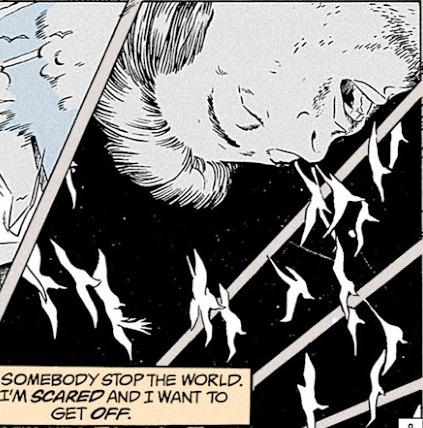
Same though.
The whole scene of the power plant explosion is really well done. The art, the narration, it’s just *chief’s kiss* mwa!
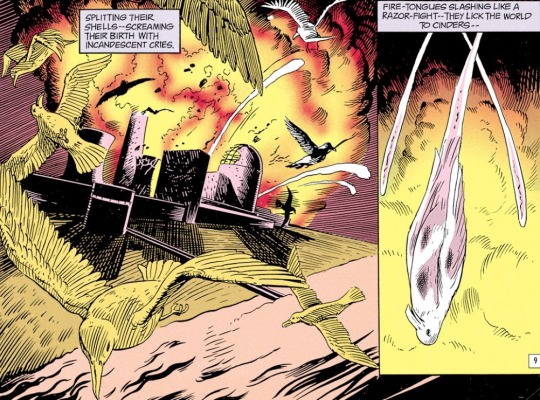
The boyfriend going back for his boots and the woman with her children really struck me. They choose to stay close to the danger and worry over trivial things in the face of what is happening. Even the girlfriend arguing with John; she’s wanting cigarettes at a time like that. It parallels how a lot of the public looks at these situations, I think. I mean, just look at how people have reacted to the COVID pandemic; choosing to go out and risk their health as well as the health of others over trivial things. Do boots really matter when a reactor has exploded? Is going to a bar with the boys really more important than staying home to keep from being exposed to a deadly virus?
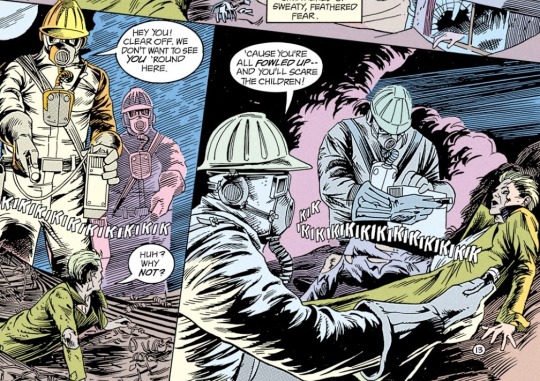
The “rescue” team that chases off John as he climbs through the ruins is pretty true to life, honestly. Caring more about the image of things and how well they can hide the reality of the aftermath than actually helping people. After all, if the world saw once again what destruction a nuclear meltdown can cause, it would cause worldwide outcry. No reason to scare them, right? Just hide all the bodies. Nuclear power is “safe” after all.
Nice references to Peter Pan.
Aaaaand now, this is where the weird finally reaches it’s peak.
Now, I had a few thoughts reading this section; how this whole issue could have parallels to human nature in it’s most basic form; disaster and industrial progress could actually send us back to a more primal state; the instinct to breed and continue on is innate even through a nuclear winter; evolution marches on; etc. I could elaborate, but that would be exhausting to write. Really, this explains everything.
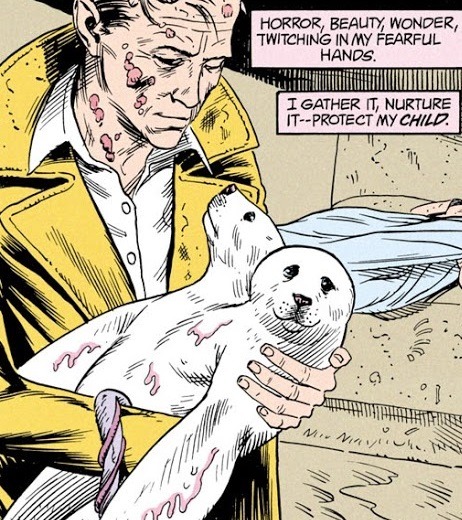
Honestly, knowing what John has been through, it does not shock me that his dreams are like this.
24 notes
·
View notes
Text
Paul Roberts: How he taught Harry Styles his gloom-busting Kindness moves
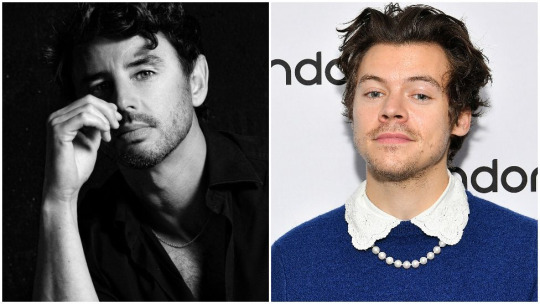
When the Harry Styles video for Treat People With Kindness was released it became an immediate hit. Its choreographer Paul Roberts had created dances for One Direction - though with 1D there was no Phoebe Waller-Bridge to consider. So how did Roberts combine the two stars' talents to create the energy-lift which people have been craving in the Covid gloom?
Styles' video for Treat People with Kindness came out on New Year's Day - though it was shot in London in February 2020.
Choreographer Roberts had worked often with Styles in the One Direction years. Roberts says the timing of the shoot, at the art deco Troxy in Stepney, east London, turned out to be fortuitous.
"We had a great time but we didn't know how lucky we were. Looking back it was about three weeks before the world started to burn. Maybe that's partly why people are loving it now - the video has such a carefree sense to it."
Roberts has had 20 years as one of the UK's most in-demand commercial choreographers. He created dances for the 2019 Spice World tour and has worked with everyone from Katy Perry to Sir Paul McCartney.
He devised work for the dance group BalletBoyz and, as well as stage work, he choreographed One Direction in videos such as Kiss You, Steal My Girl and Best Song Ever.
"So when Harry got in touch to say he wanted me for a new video it was a thrill. The only definite thing was it would be a song from the album Fine Line - but we didn't even know which song would be chosen."
With One Direction, Roberts spent six years working with a hugely successful boy band whose members insisted dance would never become a major part of the act.
'Waiting for 10 years'
Wasn't that a choreographer's nightmare?
"It was always really interesting working with One Direction. I knew very early on that there was a magic about them and I could see they had other skill-sets aside from being this very good-looking five-piece - and then four-piece - band.
"In personal moments you got to see them flourish. They'd mess around doing silly dance moves but I'd think, 'Actually if you wanted to dance really well you sure as hell could do it.'
"So when Harry contacted me and we spoke about doing a video with a lot of dance I was like, 'Well I've been waiting 10 years for this.'" Styles knew he wanted Phoebe Waller-Bridge to have an equal presence.
"I believe Harry went to see Phoebe in the West End when she had her success with Fleabag. They went out to dinner and got on really well. That's when Harry started to think how they could work together in some way."
Before shooting began there was a five-week rehearsal period - far more generous than most projects ever get. But a lot of the time Styles and Waller-Bridge weren't in the same room or indeed country.
"I was with Harry in a dance studio in London and we had all kinds of music to try out from modern alternative stuff to old school big band and Glenn Miller. We were exploring. Only on the third day did we begin to apply what we'd done specifically to the Treat People With Kindness track.
"Meanwhile Phoebe was in Canada working on the James Bond script. But fortunately I had a brilliant assistant on the project called Jared Hageman so Jared flew out to work with Phoebe. And eventually Harry needed to be in LA so I went there.
"He was amazingly devoted to the whole thing. He'd be shooting the Watermelon Sugar promo in Malibu and they'd wrap at 8pm but he'd get in a car and come to the studio and we'd rehearse moves until gone midnight."
Roberts says by then it was clear the choreography would at least nod to the Hollywood of an earlier age.
'Dance language'
"The directors Ben and Gabe Turner sent me a link to a black and white movie from 1943 called Stormy Weather. There is a justly famous sequence in it with the Nicholas Brothers, Fayard and Harold, called Jumpin' Jive.
"I think it's the greatest dance-sequence ever filmed and Gabe and Ben and Harry all wanted our video to have some of the same feel.
"I think in Harry's head he wanted to push himself to the absolute limit of what he was capable of. We were never talking about just an average soft-shoe shuffle.
"So the reality was that I and Jared would talk constantly and exchange material from thousands of miles part. And of course Phoebe and Harry would also pitch in ideas.
"We wanted to find a dance language that would take things as far as we could possibly go with Phoebe and Harry, without it becoming comedic.
"Actually my big worry was practical - that they'd both start out with massive energy but that as the weeks progressed you'd have these two incredibly busy people with no time for everything needed to make the project special. But neither would give up, not for a moment."
Nostalgia for better times
He says it was important the dancing had a contemporary edge as well. "Harry and Phoebe are modern artists and very intelligent. They're fashion forward-thinking.
"I find that once you've stopped giving artists their steps it's often quite nice to step back and just watch how they interpret the music. Sometimes little gems can be grabbed and put into the mix.
"It was discovered very early on that both Harry and Phoebe had huge potential. The delight came from their energy combined with the talent of the film-makers plus the extended period of time we had to rehearse.
"I work in a world where budgets have shrunk considerably so it was a big investment for managements and Harry's label."
Roberts remembers the two stars finally came together for little more than the last week of the project, including the shoot. But there was still time to bring in a ballet dancer to give guidance on "port de bras" - how to hold your shoulders or extend an arm gracefully.
"Harry and Phoebe are both decent and generous beings. So we all kept it fun, despite the blood, sweat and tears which had gone into the preparation.
"When finally we were together they could layer on little side-eyed glances or maybe some tiny movement of the face which the camera would pick up. Above all we wanted a sense of style [no pun intended] and panache."
He says the fact most of us feel a real lack of either style or panache in our lives has given Treat People With Kindness an impact as a video it might not otherwise have had.
"The whole thing has a nostalgia for a time where you could be in a club and socialise with friends with no social distancing. I think the chemistry Harry and Phoebe have together just oozes joy. And for most people joy is in short supply."
via BBC.com
90 notes
·
View notes
Text
It seems like many, perhaps most, people historically believed in some immanent apocalypse.
Many philosophies claim that the world is passing into a degenerate age of chaos (Ages of Man, Kali Yuga, life-cycle of civilisation), or divine conflict will shortly spill over & destroy the Earth (Ragnorok, Revelations, Zoroastrian Frashokereti), or that the natural forces sustaining us must be transient.
Yet few panic or do anything. What anyone does "do about it" is often symbolic & self-admittedly unlikely to do much.
Maybe humans evolved not to care, to avoid being manipulated?
Many cults make similar claims, and do uproot their lives around them. Even very rarely committing mass suicide or terror attacks etc on occasion. But cults exist that don't make such claims, so it may not be the mechanism they use to control, or at most a minor one. "This is about the fate of the whole world, nothing can be more important than that, so shut up" may work as as a thought terminating cliche, but it doesn't seem to work that strongly, and there are many at least equally effective ones.
Some large scale orgs do exist that seem to take their eschatology "seriously". The Aztecs committed atrocities trying to hold off apocalypse, ISIS trying to cause it. Arguably some Communist or even fascist groups count, depending on your definition of apocalypse.
But even then, one can argue their actions are not radically different from non-apocalypse-motivated ones - e.g. the Aztecs mass-executed less per capita than the UK did at times & some historians view them as more about displaying authority.
I'm thinking about this because of two secular eschatologies - climate apocalypse and the Singularity.
My view on climate change, which as far as I can tell is the scientific consensus, is that it is real and bad but by no means apocalyptic. We're talking incremental increases in storms, droughts, floods etc, all of which are terrible, but none of which remotely threaten human civilisation. E.g. according to the first Google result, the sea is set to rise by 1 decimeter by 2100 in a "high emissions scenario", not to rise by tens or hundreds of meters and consume all coastal nations as I was taught as a child. Some more drastic projections suggest that the sea might rise by as much as two or three meters in the worst case scenario.
It really creeps me out when I hear people who confess to believe that human civilisation, the human species, or even all life on Earth is most likely going to be destroyed soon by climate change. The most recent example, which prompted this post, was the Call of Cthulhu podcast I was listening to casually suggesting that it might be a good idea to summon an Elder God of ice and snow to combat climate change as the "lesser existential risk", perhaps by sacrificing "climate skeptics" to it. It's incredibly jarring for me to realise that the guys I've been listening to casually chatting about RPGs think they live in a world that will shortly be ended by the greed of it's rulers. But this idea is everywhere. Discussions of existential risks from e.g. pandemics inevitably attract people arguing that the real existential risk is climate change. A major anti-global-warming protest movement, Extinction Rebellion, is literally named after the idea that they're fighting against their own extinction. Viral Tumblr posts talk about how the fear of knowing that the world is probably going to be destroyed soon by climate change and fascism is crippling their mental health, and they have no idea how to deal with it because it's all so real.
But it's not. It's not real.
Well, I can't claim that political science is accurate enough for me to definitively say that fascism isn't going to take over, but I can say that climate science is fairly accurate and it predicts that the world is definitely not about to end in fire or in flood.
(There are valid arguments that climate change or other environmental issues might precipitate wars, which could turn apocalyptic due to nuclear weapons; or that we might potentially encounter a black swan event due to our poor understanding of the ecosystem and climate-feedback systems. But these are very different, as they're self-admittedly "just" small risks to the world.)
And I get the impression that a lot of people with more realistic views about climate change deliberately pander to this, deliberately encouraging people to believe that they're going to die because it puts them on the "right side of the issue". The MCU's Loki, for instance, recently casually brought up a "climate apocalypse" in 2050, which many viewers took as meaning the world ending. Technically, the show uses a broad definition of "apocalypse" - Pompeii is given as another example - and it kind of seems like maybe all they meant was natural disasters encouraged by climate change, totally defensible. But I still felt kinda mad about it, that they're deliberately pandering to an idea which they hopefully know is false and which is causing incredible anxiety in people. I remember when Greta Thurnberg was a big deal, I read through her speeches to Extinction Rebellion, and if you parsed them closely it seemed like she actually did have a somewhat realistic understanding of what climate change is. But she would never come out and say it, it was all vague implications of doom, which she was happily giving to a rally called "Extinction Rebellion" filled with speakers who were explicitly stating, not just coyly implying, that this was a fight for humanity's survival against all the great powers of the world.
But maybe there's nothing wrong with that. I despise lying, but as I've been rambling about, this is a very common lie that most people somehow seem unaffected by. Maybe the viral tumblr posts are wrong about the source of their anxiety; maybe it's internal/neurochemical and they world just have picked some other topic to project their anxieties on if this particular apocalypse wasn't available. Maybe this isn't a particularly harmful lie, and it's hypocritical of me to be shocked by those who believe it.
Incidentally, I believe the world is probably going to end within the next fifty years.
Intellectually, I find the arguments that superhuman AI will destroy the world pretty undeniable. Sure, forecasting the path of future technology is inherently unreliable. But the existence of human brains, some of which are quite smart, proves pretty conclusively it's possible to get lumps of matter to think - and human brains are designed to run on the tiny amounts of energy they can get by scavenging plants and the occasional scraps of meat in the wilderness as fuel, with chemical signals that propagate at around the speed of sound (much slower than electronic ones), with only the data they can get from input devices they carry around with them, and which break down irrevocably after a few decades. And while we cannot necessarily extrapolate from the history of progress in both computer hardware and AI, that progress is incredibly impressive, and there's no particular reason to believe it will fortuitously stop right before we manufacture enough rope to hang ourselves.
Right now, at time of writing, we have neural nets that can write basic code, appear to scale linearly in effectiveness with the available hardware with no signs that we're reaching their limit, and have not yet been applied at the current limits of available hardware let alone what will be available in a few years. They absorb information like a sponge at a vastly superhuman speed and scale, allowing them to be trained in days or hours rather than the years or decades humans require. They are already human-level or massively superhuman at many tasks, and are capable of many things I would have confidently told you a few years ago were probably impossible without human-level intelligence, like the crazy shit AI dungeon is capable of. People are actively working on scaling them up so that they can work on and improve the sort of code they are made from. And we have no ability to tell what they're thinking or control them without a ton of trial and error.
If you follow this blog, you're probably familiar with all the above arguments for why we're probably very close to getting clobbered by superhuman AI, and many more, as well as all the standard counter-arguments and the counter-arguments to those counter arguments.
(Note: I do take some comfort in God, but even if my faith were so rock solid that I would cheerfully bet the world on it - which it's not - there's no real reason why our purpose in God's plan couldn't be to destroy ourselves or be destroyed as an object lesson to some other, more important civilization. There's ample precedent.)
Here's the thing: I'm not doing anything about it, unless you count occasionally, casually talking about it with people online. I'm not even donating to help any of the terrifyingly-few people who are trying to do something about it. Part of why I'm not contributing is, frankly, I don't have a clue what to do, nor do I have much confidence in any of the stuff people are currently doing (although I bloody well hope some of it works.)
And yet I don't actually feel that scared.
I feel more of a visceral chill reading about the nuclear close calls that almost destroyed the world in the recent past than thinking about the stuff that has a serious chance of doing so in a few decades. I'm a neurotic mess, and yet what is objectively the most terrifying thing on my radar does not actually seem to contribute to my neurosis.
21 notes
·
View notes
Link
When the Harry Styles video for Treat People With Kindness was released it became an immediate hit. Its choreographer Paul Roberts had created dances for One Direction - though with 1D there was no Phoebe Waller-Bridge to consider. So how did Roberts combine the two stars' talents to create the energy-lift which people have been craving in the Covid gloom?
Styles' video for Treat People with Kindness came out on New Year's Day - though it was shot in London in February 2020.
Choreographer Roberts had worked often with Styles in the One Direction years. Roberts says the timing of the shoot, at the art deco Troxy in Stepney, east London, turned out to be fortuitous.
"We had a great time but we didn't know how lucky we were. Looking back it was about three weeks before the world started to burn. Maybe that's partly why people are loving it now - the video has such a carefree sense to it."
Roberts has had 20 years as one of the UK's most in-demand commercial choreographers. He created dances for the 2019 Spice World tour and has worked with everyone from Katy Perry to Sir Paul McCartney.
He devised work for the dance group BalletBoyz and, as well as stage work, he choreographed One Direction in videos such as Kiss You, Steal My Girl and Best Song Ever.
"So when Harry got in touch to say he wanted me for a new video it was a thrill. The only definite thing was it would be a song from the album Fine Line - but we didn't even know which song would be chosen."
With One Direction, Roberts spent six years working with a hugely successful boy band whose members insisted dance would never become a major part of the act.
'Waiting for 10 years'
Wasn't that a choreographer's nightmare?
"It was always really interesting working with One Direction. I knew very early on that there was a magic about them and I could see they had other skill-sets aside from being this very good-looking five-piece - and then four-piece - band.
"In personal moments you got to see them flourish. They'd mess around doing silly dance moves but I'd think, 'Actually if you wanted to dance really well you sure as hell could do it.'
"So when Harry contacted me and we spoke about doing a video with a lot of dance I was like, 'Well I've been waiting 10 years for this.'" Styles knew he wanted Phoebe Waller-Bridge to have an equal presence.
"I believe Harry went to see Phoebe in the West End when she had her success with Fleabag. They went out to dinner and got on really well. That's when Harry started to think how they could work together in some way."
Before shooting began there was a five-week rehearsal period - far more generous than most projects ever get. But a lot of the time Styles and Waller-Bridge weren't in the same room or indeed country.
"I was with Harry in a dance studio in London and we had all kinds of music to try out from modern alternative stuff to old school big band and Glenn Miller. We were exploring. Only on the third day did we begin to apply what we'd done specifically to the Treat People With Kindness track.
"Meanwhile Phoebe was in Canada working on the James Bond script. But fortunately I had a brilliant assistant on the project called Jared Hageman so Jared flew out to work with Phoebe. And eventually Harry needed to be in LA so I went there.
"He was amazingly devoted to the whole thing. He'd be shooting the Watermelon Sugar promo in Malibu and they'd wrap at 8pm but he'd get in a car and come to the studio and we'd rehearse moves until gone midnight."
Roberts says by then it was clear the choreography would at least nod to the Hollywood of an earlier age.
'Dance language'
"The directors Ben and Gabe Turner sent me a link to a black and white movie from 1943 called Stormy Weather. There is a justly famous sequence in it with the Nicholas Brothers, Fayard and Harold, called Jumpin' Jive.
"I think it's the greatest dance-sequence ever filmed and Gabe and Ben and Harry all wanted our video to have some of the same feel.
"I think in Harry's head he wanted to push himself to the absolute limit of what he was capable of. We were never talking about just an average soft-shoe shuffle.
"So the reality was that I and Jared would talk constantly and exchange material from thousands of miles part. And of course Phoebe and Harry would also pitch in ideas.
"We wanted to find a dance language that would take things as far as we could possibly go with Phoebe and Harry, without it becoming comedic.
"Actually my big worry was practical - that they'd both start out with massive energy but that as the weeks progressed you'd have these two incredibly busy people with no time for everything needed to make the project special. But neither would give up, not for a moment."
Nostalgia for better times
He says it was important the dancing had a contemporary edge as well. "Harry and Phoebe are modern artists and very intelligent. They're fashion forward-thinking.
"I find that once you've stopped giving artists their steps it's often quite nice to step back and just watch how they interpret the music. Sometimes little gems can be grabbed and put into the mix.
"It was discovered very early on that both Harry and Phoebe had huge potential. The delight came from their energy combined with the talent of the film-makers plus the extended period of time we had to rehearse.
"I work in a world where budgets have shrunk considerably so it was a big investment for managements and Harry's label."
Roberts remembers the two stars finally came together for little more than the last week of the project, including the shoot. But there was still time to bring in a ballet dancer to give guidance on "port de bras" - how to hold your shoulders or extend an arm gracefully.
"Harry and Phoebe are both decent and generous beings. So we all kept it fun, despite the blood, sweat and tears which had gone into the preparation.
"When finally we were together they could layer on little side-eyed glances or maybe some tiny movement of the face which the camera would pick up. Above all we wanted a sense of style [no pun intended] and panache."
He says the fact most of us feel a real lack of either style or panache in our lives has given Treat People With Kindness an impact as a video it might not otherwise have had.
"The whole thing has a nostalgia for a time where you could be in a club and socialise with friends with no social distancing. I think the chemistry Harry and Phoebe have together just oozes joy. And for most people joy is in short supply."
52 notes
·
View notes
Text
Garbage’s Shirley Manson: “Being human is to be messy. If you think you’re above all that you’re in deep, deep trouble”
As Garbage unveil their first new album in five years, No Gods No Masters, Shirley Manson talks getting political, cancel culture, and why speaking up is more important than ever…
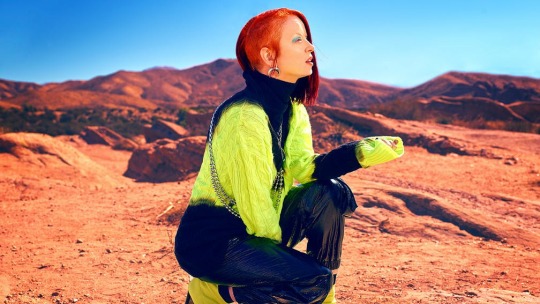
A metaphorical low for Shirley Manson involved a poster, a car journey and getting dumped. A lawyer for Garbage’s label Interscope records called and told her she was dropped.
“I was about 40 years old at the time. My mother was dying, I was abjectly miserable, my career was on the skids,” she remembers, convincing herself at the time, “You will never again recover, you’re a woman over 40, you’re screwed.”
On the journey home alone after this call, she drove down Los Feliz Boulevard, five minutes from her house, and looked to her right. There in front of her was a shop-sized display poster of Garbage being sold at a yard sale for a few dollars. “I looked at myself being sold on the street, literally. And I burst into tears and I slumped down in my car because I felt like everyone could see me. I felt deep, deep shame, which is not an emotion I experience often, for my sins.”
Shirley explains today from her LA home that shortly after that experience she had a revelation: “It doesn’t matter if you never get signed to a record label again. It doesn’t matter if you never perform again in public, you can still be a singer, you can still be a creator, you can still be an artist.” Since that moment, her career – and her relationship to it – has been a healthy one. Still, the lyrics she wrote based off this pivotal experience were words she was eager to use in a song for 12 years. Nothing quite felt right… until now. They appear on a heavier highlight of Garbage’s new record, The Creeps (‘I was so upset, I saw them selling me out / Right there on Los Feliz Boulevard’). “That song is about not listening to my feelings – that narrative I feed myself is often just as negative and inaccurate as a stranger telling me what to think.”
The capitalistic misogyny of the music industry and the world at large is just one of the weighty topics Garbage sink their teeth into on No Gods No Masters. Tinged with a gothic darkness, it’s a dystopian, slow-paced and angular album, and one that feels timely for all its ’80s sonic influences. It stands out from their other releases for covering racism and police brutality and wealth disparity. A reoccurring image of white men as undeserving and cruel gods looms large. These themes that have been relevant for decades – if not centuries, millennia – but listen to it and you can’t ignore the fact it speaks to the last couple of years.
Speaking of the pandemic, Shirley is feeling grateful and thoughtful for her own circumstances. As a musician she’s been focused on the injustice in the lack of support for artists on both sides of the Atlantic (“You’re literally considered a nothing as a musician”). In the UK, those involved in the live music industry were encouraged by the Conservative government to retrain. But they’re fortunate, thinks Shirley, if only compared to America, where government furlough money didn’t help those whose jobs were in jeopardy or defunct.
“I’m concerned about all the young musicians who have not received any support from their government, and have been left to rot,” she says. “I know a lot of struggling musicians who literally can barely feed themselves. We’ve got a terrible homeless situation here in LA, and I have people living in tents two steps away from my house. And that is a very healthy reminder of my good fortune and my privilege.”
Opening up about adversity faced by musicians – especially female musicians – within the industry is something Shirley has done for years. The commentary around Garbage’s treatment by labels or ageism inadvertently leveraged against her has followed the band through almost every step of their career. It’s a significant part of the Garbage story.

“I think a lot of artists are fearful of speaking the truth,” she says when this is put to her. “I just think that the most powerful version of oneself is the most authentic version. That to me is when you have no secrets, you’re not cowed, you’re not scared, because the truth is out. I think people are very frightened that people discover things about them. And that truly does make you vulnerable. When you’re lying and deceiving, you’re constantly spending energy trying to hide your life. And I just don’t have time for that.”
No Gods No Masters is the first major label release from Garbage for years, and unusually – ironically, almost – it’s their most political. Their last two albums – 2012’s Not Your Kind Of People and 2016’s Strange Little Birds – were released independently through Garbage’s own label Stunvolume, which they set up to be free, of “greedy corporate interest”, as the band put it in a Facebook post at the time. The decision to return to a label was because they struggled to maintain their footing in the industry without it: “We couldn’t really get our records distributed. We couldn’t get on radio; nobody would take our calls. We simply could not compete. We realised that if we didn’t make this leap at this particular moment in time, we would drown entirely.” But returning to the corporate fold explicitly meant not giving up creative freedom. One of the key understandings was Garbage having total control over whatever they did.
But Shirley wasn’t overly concerned about the threat of control anyway.
“If you’re lucky enough to stick around long enough, the economics of [our] sort of discography allow you a certain kind of autonomy,” she says.
So there was no pressure from people telling you not to make a political record, for example?
“I think as you get older, you’re able to parse pressures more effectively. You’re able to set boundaries. You can hold that [boundary] and not fret that somehow you’re going to be punished for that. Because that’s the deal: if you have integrity and you don’t compromise, you will be punished for it. That’s how it works. As you get older, you stop caring so much about that threat and about that reality.”
Back in 2018, Shirley experienced another turning point. She was asked to speak alongside trans black activist Ashlee Marie Preston and sex educator Ericka Hart at an intersectional feminism event and was, essentially, educated herself.
“Both these women are phenomenal powerhouses and they have great minds, agile minds, and they really took me to school. And they were very gentle with me, I have to say, but I was mortified at my ignorance, regarding systemic racism and a whole gamut of things. I determined then I had to educate myself about the black experience that I knew nothing about.”
In these situations, it is often the case that white people get defensive and shut down. “I too had a flare up of defensiveness, but I knew deep down, you don’t feel your ears burning for no reason.” Her education involved reading Patrisse Cullors and Asha Bandele’s When They Call You A Terrorist: A Black Lives Matter Memoir and James Baldwin, Maya Angelou and Alice Walker. It was watching The 13th, the documentary by Ava DuVernay. It was learning about the murder of Trayvon Martin and the murders of other black people at white hands, the hands of police.
This drive to self-educate didn’t fizzle out after a brief spell. “I’ve spent 54 years, or 50 years, being an ignorant, white privileged woman in the world. And I’ve got a lot to learn, and I look forward to learning more,” Shirley says. Feelings of sadness and shame were mixed with an understanding that she was being compliant in ignoring black suffering, as she was trained and expected to. “We’re conditioned to not look, because once you start looking, you can’t turn away, unless you’re a monster or a devil.”
The year 2018 was also when the band started writing for the album, though Shirley says there was no intention for this to be a political record. “Nothing’s premeditated, and nothing is planned,” she reveals of when the band get together to write an album. It’s a process of them coming together and simply writing in the moment, with Shirley responding to the music the rest of the band provide. It just happened that it coincided with this reckoning in her personal life: “I just allowed who I was in my private life to come out into the record, all the preoccupations at that time, dripped out onto this record, simply because I didn’t put up a barrier.”
Most of the writing happened in Palm Springs at Garbage guitarist Steve Marker’s in-laws’ house. Even for a band as legendary as Garbage, there are financial considerations (“It was free accommodation,” Shirley laughs). “Bands now have to be really careful about their economics. That’s why there’s a plethora of solo artists and fewer and fewer bands, because they are hard to sustain. They’re these weird little microcosms that nobody wants to spend money on. We had a limited budget and we were like, ‘Okay, how are we going to pull this off?’”
They honed in on their long-time influences of Roxy Music, Gary Numan, Siouxsie And The Banshees, The Cure and Talking Heads to create an ’80s feel. The fact that Butch Vig received a delivery of a brand new drum machine the day they started writing set the pace of the record, quite literally. “He didn’t know how to work it,” she remembers. “The fact the drum tracks sound rudimentary are just because he was feeling out how to work this machine.”
From its opening track, The Men Who Rule The World, it’s evident this is a record about men who set up and maintain the capitalistic structures that are destroying the planet and lives for the vast majority in work. Mention the fact that nearly 500 people became billionaires during the pandemic and Shirley replies: “These billionaires are more powerful than any government in the world. How is that even legal? I said earlier about people living outside my house in tents: it’s heartbreaking, too painful, too obscene.”
To write songs like Waiting For God, a self-explanatory track about racism if you listen to the lyrics, opens Garbage up to getting it wrong. This is a small price to pay for speaking on these topics, Shirley says. “If that requires that I be a little discomforted, so be it. If that requires somebody pointing a finger at me and laughing at me or criticising me, so be it. I’m middle-aged, and I’m starting to see the end of my lifespan. And I don’t want to leave this world thinking that I didn’t lift a finger to try and make things better for generations to follow. I want to know that I at least tried to speak up in defence of someone else. As white people, we all have to just get over ourselves a little and be willing to be uncomfortable.”
And why is a fear of being cancelled by people for getting it wrong more important than having a go at making the right statement?
“Cancel culture is such a tool of bullying and again, a tool of shutting you down and shutting you up,” replies Shirley. “Every human being, every artist, every icon has made mistakes. You’re not going to find a perfect person in the world ever. And I think it’s so immature and silly to think that you will. And my God, how hard are you being on yourself, if that’s how hard you’re being on other people?
“Being human is to be messy,” she continues. “And if you think you’re above all that you’re in deep, deep trouble.”
It’s inevitable that some listeners will think this album has been written in response to the last couple of years, rather than envisioned three or more years ago. While the members of Garbage are pleased they’ve made a record that feels prescient, it’s both an ancient and timeless album: these are the oldest issues known to humankind. But in true Shirley Manson style, her feelings and opinions are disclosed to us listeners as evidence of where she was and where she is.
“I’m sort of grateful for the record,” says Shirley. “We have a public testimony of where we stand in this world as people currently. What we’re in disagreement with, what appalls us, and the hope that we have for the future.”
9 notes
·
View notes
Text
Why Do I Hate Ivermectin?
I was asked to do an article on ivermectin and I feel that it is important to understand the science behind ivermectin (and HCQ). I think if you know the science, you will be as skeptical as I am.
I was once being quizzed by an Attending Physician when I was a resident. I stuttered as I was answering and said, “I think…” He stopped me mid-sentence and said, “Son, you are a second year internal medicine resident, I don’t give a shit what you think. What do you know?”
You see, it really isn’t relevant to all of you what I think. You aren’t interested in my opinion. You are reading this post because you are interested in what I know. I don’t take anything at face value and I always read all of the studies that people are using as a reference to prove a point. The thing is, most “studies” aren’t worth the paper they are printed on and don’t actually “study” anything. Worst thing is, sometimes it’s a fake.
We all know about the faked anti-vaccine trial by Andrew Wakefield, the completely discredited, former doctor, who started the anti-vaccine movement by faking data on autism and vaccines. In case you didn’t, he faked the original anti-vaccine study and In 2010, the British General medical council found that Wakefield “had been dishonest in his research, had acted against his patients' best interests and mistreated developmentally delayed children.” That’s right anti-vaxxers. That’s your start, one giant lie.
I have read all of the studies that I will make reference to in this post and regrettably, every study I can find on ivermectin. As of now, I do not see any evidence that supports the use of ivermectin for Covid in humans outside of a clinical trial. Hey! That’s what the cdc says too….odd.
In general, American doctors are snobby. We want studies from Europe, Israel, Australia, Canada and the good ole USA. We don’t want studies from countries with dictatorships or totalitarian regimes. These countries have a long track record of producing fake studies and bad studies. Countries such as China, Egypt, Iran, Iraq, Brazil, Venezuela, etc. You know, the same governments that hack us and steel info from us, those ones. It is in their governments interest to make all of their people think they have a treatment for covid, otherwise there would be revolts. American doctors generally would never consider a study from Egypt as high quality, unless it was published in a very well respected journal. There just isn’t any quality control.
The science behind HCQ is basically the same, except with ivermectin, a large clinical trial showing it helped, was all fake. HCQ just didn’t work. Lots of us used HCQ at the beginning of covid until real studies were done showing it didn’t work and may actually worsen outcomes.
Remember, most drugs are safe in normal doses, but toxic in doses outside of the “therapeutic window” that is the dose that both will have the desired effect, but also is safe and well tolerated. Too little drug, it doesn’t work, too much drug, it causes toxicity.
First, It is very important to test all drugs that are easily available for activity in covid. This starts in a test tube. Ivermectin was approved in 1996 for the treatment of strongyloides and hookworms. In animal studies, it is lethal in overdose and causes toxicity at 10x the approved dose. It also was found to be a teratogen (birth defects) and is not approved for use in pregnant women. Otherwise, it is quite safe and effective in comparison to approved treatments of the time and was approved after being studied in about 1700 patients (half given ivermectin, half given old treatments). It is widely available and is pretty safe (Except in pregnancy).
Ivermectin was found to have in vitro (test tube) activity against the SARS COV2 virus. I know that sounds great, but remember what we said about the therapeutic window. It was shown, in the test tube, to inhibit activity of covid by 50% at a concentration of 2 μM (1,750 ng/mL), which is > 35× higher than the maximum plasma concentration (Cmax) of 0.05 µM (46.6 ng/mL) after oral administration of the approved dose (~ 200 μg/kg) and ivermectin showed little to no activity at 1 μM in vitro.
Wait, so that means you would need 35 times the approved dose to inhibit covid and ivermectin is toxic at 10x the dose. It also causes birth defects? Count me out.
As you might imagine, based on this knowledge it is very hard for me to believe that you can safely dosed ivermectin could have any benefit for covid. Now, on to the bad studies.
Remember what I said about studies from certain countries?
In November, an article from Egypt was published without review in an online site called Research Square. Never heard of it? Me either? It showed a 99% reduction in mortality. Holy crap, that’s amazing, right? Of course. Despite it having such a completely unrealistic outcome, many doctors picked this up and ran with it. In America, a group of doctors that named themselves the FLCCC, led by two guys named Paul Marik and Pierre Kory, latched on to this and started spouting its effects. I personally have a lot knowledge and not a lot of respect for Marik’s work predating covid. His FLCCC “treatment guidelines” have never been evidence based and in general he has never been able to publish studies that prove his claims.
So after this first study from Egypt comes out, a bunch of studies follow and are picked up by Marik’s group. They did a “review” of them and included the Egyptian study. Most of the studies aren’t even reviewed and are published online as “preprint.” They are from Egypt, India, Iraq, Bangladesh, Pakistan, Peru, Nigeria, Mexico, and Argentina. None of these places are exactly known for being in the 1st world and none of the other studies showed the massive effect as the Egyptian study.
Then, a medical student in the UK is assigned the Egyptian study for a report. He actually reads the study. It doesn’t make sense. He then requests more information from the authors and they sent him the “patient data.” It was clearly faked and he got some journalists involved. After they involved an expert on faked studies, the study was then taken down from Research Square over “ethical concerns.” Too bad Marik didn’t bother to do what the med student did.
Unfortunately, this has led to a massive amount of confusion. If you think that there is a treatment for covid, you might not take the vaccine. Even If it worked, we would be taking about a minimal effect. Heck, it could even be toxic if you give it to that many people. The other big problem is we have to do a bunch of American studies to see if it does work. Studies that could have been done with another treatment. What a waste of time and lives.
So why do I hate ivermectin? Well, I don’t. I hate the waste of time I have spent writing this article to discuss a drug that could only be effective for covid if you took enough to kill you. I hate the people that faked the study, they have cost lives. I don’t hate Marik, but I definitely think he is crazy and I’m not interested in what he thinks and that isn’t new. Unfortunately he has a big microphone and I just have this little one.
My biggest recommendation is ask your doctor if you should have the vaccine. If you trust YOUR doctor, listen to HIM or HER. Not some YAHOO online like ME. Remember, you trust your doctors to take care of your babies, born and unborn, cut you open, give us anesthesia and put cameras in all our holes. You trust them to help you make major medical decisions about your life. Keep doing that, they care about you. We care about you.
Please, don’t post any articles in support of ivermectin. I read them and found them lacking. Also, don’t post another doctors opinion of ivermectin. I don’t care what they think, just what they know.
PS: I am a Critical Care Pulmonologist, I take care of sick people. Hopefully that won’t be you.
Oh yeah. Feel free to share. I should really charge for these.
6 notes
·
View notes